#but that clearly establishes some changes to the narrative
Text
thing about rose, for me, is that she wasn't there first -- this in a "she was first in nu!who in the sense that this was the first person to travel with nine, and the first person since the timewar, and the last person that nine was with, to the point that ten was born out of that experience/modelled on her."
and in that framing, I am a big fan of her haunting of the narrative, because it start outs with her placing herself inside the doctor's ribcage and rebooting their ability to want to feel things, but unfortunately rose is still a human, like every human the doctor travelled with before, it's just that the doctor forgot how to steel themself against that inevitability because of the circumstances around meeting rose
this is The thing that I find tragic about martha, because I think she could have been that person, if she'd been the first person post-timewar to travel with the doctor, but because she's coming in during bleeding-heart times, she's got to deal with triage instead. and yes, there are wonders, and yes, there are good times, but for a lot of it, it's shrapnel, and I think if it hadn't been, she would have had a very different attitude towards *waves hands* space and time travel and aliens and the universe (one where she wouldn't be the person trusted with something like the osterhagen key)
and donna had a sense of that Space the doctor was in post-rose (she canonically stopped the doctor from dying in runaway bride) and stepped away from it, and didn't get back to the doctor until some of that hole-in-chest had been bandaged up, which martha did a great job of, but didn't get to really benefit from, and I think that's the sad thing about martha jones, is that she absolutely got a taste of the beauty and the splendor, but never without all the violence and heave weight that was put onto her
which, again, she seems to have been very aware of, considering she joined UNIT and Torchwood. her eyes were barely ever rose tinted (no pun here) during her whole journey in the story. martha really is in my opinion the most tragic companion (that I've met so far, I know Adric straight up dies, but maybe he had some fun times before that?), because yes, donna loses her memories and rose is in a parallel universe, but that's more tragic for the doctor -- they've both built lives
in donna's case there's probably a lot of imperfection in that life, but clearly a lot of joy as well, with her and her husband and her kid and her mum, and I'm sure she'd have preferred to be the donna who saw the universe and was splendid, but martha never gets to forget, and has to continue her life one step out of sync of everything she could have been
which, maybe her life is pretty flipping fantastic, but we really don't know, which is the biggest thing I side-eye about the first nu!who era. that whole weird ending with the sontaran and mickey is like... anti-character work, it answers nothing and it makes very little sense
all I know about her at the end is that she more than anyone saw the doctor's life and became a soldier (still a doctor as well, but...) because that was the work she saw needed doing, and she's the kind of person who does what needs doing. but is she... okay? youknow?
but going back to the original point, is that framing martha through the lens of rose is all well and good in the sense that rose is the reason the doctor is at that emotional point when he meets martha -- although donna absolutely had a very big hand in that as well -- but once we've established that, martha's arc is martha's arc, and it's dull to me to frame it as the "rebound" arc or even particularly about alloromanticism (including -- and this is why i get why people do it in fandom -- some shit said by rtd, which is just less interesting than what I get out of it, so shhhh)
she's got so much going on, and her relationship with the doctor changes the trajectory of her life, and it's in many ways a more interesting and far less straightforward trajectory of bad-to-better that many companions get -- it's a wonderfully complicated narrative that (and again, I get that some of this comes from within deliberate framings of the text, even though I think it's more than open enough to do more with, death of the author and all that -- but certainly not all of this is text either, some of it is ignoring what is actually there) is done a disservice by not going through the real messed up fascinating extraordinary shit that's going on during her era + arc in s4
but also... is she ok? I want to know. it's one of my top three burning questions, since we're getting a bit of best-ofs of the noughties DW era, some of your crimes can be righted by a simple bit of martha mr davies
#me wanting to see martha in the 60th just to confirm she's doing okay#pls 🥺👉👈#tbh im sure freema is doing Stuff but she shoulda been in at least one UNIT episode in m*ffat or chibnall era#martha jones#doctor who#dw#doctor who meta#this is very rambly#i think for example martha in sontaran stratagem is severely underrated because she gets captured and has to be saved#(she does stuff as well but also the above)#but it's a role reversal between her and the doctor in s3! she's constantly saving the doctor in s3 she's constantly saying I've got you#and in that episode the doctor saves her and says it back!#arghhhhh someone hold martha for me my love who always has to be so strong
150 notes
·
View notes
Text
Only Friends Ep 6 Scene By Scene
This is the episode we've all been waiting for. It's the first episode where everyone is objectively a bit of an asshole; it's the first episode where truths are finally talked about, it's the episode that starts to answer two of my most burning questions (what is Boston's home life like, and where is April?), and interestingly it's the first episode we get without any obvious narrative framing or character perspective.
It was so interesting, as the clear pivot point of the story, that there was no obvious framework this ep, but this entire episode was parallels and callbacks and hypocrisy/relying on viewer knowledge to understand all of the subcurrents. I have so many thoughts that I'm talking about each scene so this post is LONG.
First scene: Top and Mew by the pool. Not enough people are giving Force and Book credit for keeping the awkward tension between these two even though they are having textbook cute moments, because these characters still don't trust one another and this scene establishes that before the rest of the episode blows them up: Mew says he's not sure they'll be together in 3 months, explicitly calling out the fragility of their relationship; and Top gets defensive at Mew insinuating he doesn't need a relationship and doesn't trust that they'll stay together, and straight-up lies that he's stopped doing drugs and having casual sex [though I do wonder how much he believes it's a lie because he's clearly cut back from his usual, and when someone does something all the time changing to doing it rarely does feel like not a big deal in comparison] and asks what else about himself he needs to change for Mew [all, by the way, while Mew is preparing to undergo permanent surgery to his eyes for Top]. We also get this called back later in the ep when Mew tells Ray to quit drugs and Ray says sure, and I have to wonder how many times that exchange has happened and if it's partly why Mew is suspicious of Top's "easy" change. Also interesting that Mew seems to be one of the only people in this friend group who has two parents (his moms) that care about him and who also have a good relationship with each other. Mew's point that he doesn't need fulfillment from a relationship because he gets it from his friends and family is interesting; especially given his friends. [Sidenote: This is basically how I feel about my own life so I am curious how other people read this assertion.] The ephemeral change of sleeping around and doing drugs vs the physical and permanent change of Lasik is really standing out to me this scene as significant.
Second scene: the meeting with the professor. It's interesting that even though they're presenting, they're the ones sitting down. Cheum says they can keep personal and professional lives separate and Ray turns to stare directly at Boston. I love that this is even before anyone else knew that the Boston/Top hookup was at the soft launch party for the hostel. Also noting Cheum's catty comment about even Boston helping; this girl is so much messier than people give her credit for [just saw @lurkingshan 's breakdown of this episode as I continue to update this post and yessssss call her out!!]
Third scene: noodles. This is I think the same place they planned the soft launch party. I'm seeing parallels with everyone pressuring Boston to date Nick to everyone pressuring Mew to sleep with Top in the first ep. Also, interesting that Cheum promises to behave this time [and then definitely doesn't]. We've all (or at least I have) been wondering where April is and now we get some explanation. I do wish they'd established this as more of a pattern for Cheum to complain like this, but I'll take it as setup now. The way Ray and his seething is invisible in this scene has been covered beautifully here [by @poetry-protest-pornography and @respectthepetty ].
Fourth scene: Ton and Nick wakeboarding. The parallels here to Top/Mew are twofold: we get the similar sitting by the water parallel from earlier this episode, in which there is a clear undercurrent of hypocrisy between what the characters are saying and what the audience knows about them (that conversation with/about Gap was so good, with the tension in Nick knowing he still has that audio clip and still hasn't deleted it as Boston berates Gap for the same thing), and then there is the contrasting parallel to when Mew took Top wakeboarding for the first time with the rest of his friend group. In contrast, Ton took Nick here alone, clearly still trying to play this game of not dating Nick but doing things with him that they would do if they were dating, that send extremely mixed signals. This scene again underscores the fragility of the relationship Boston and Nick have and how easily it can be broken.
Fifth scene: The hospital. Sand and his mom, in which we see how used he is to taking care of someone who is a bit of a mess [affectionate], and how he can still only be somewhat honest with his mom about his relationship with Ray (more than we'd expect between a 20something and their mom, but less than we the audience know is the truth--they're just having fun but it's not what he wants). And then the confrontation between Top and Sand. Top characterizes his relationship with Mew as "I get what I want" and I have to wonder how much of that is posturing to annoy Sand and how much of it is honesty. I did also think that maybe he meant it when he said "I hope you get what you want soon" because he wants Ray's attention away from Mew.
Sixth scene [start of part 2]: Sand intentionally drops and stomps on his phone to have an excuse to borrow Nick's so he can steal the sex audio. This is the first time that Sand consciously does something shitty to one of his friends, and I am living for it--let good characters make bad decisions! The parallel here is of course to Boston getting his phone fixed by Nick and having Nick steal his photo and adding one of his own from the beginning of the series; also a small one of Sand using his mom as an excuse to lie to his friend, the way Top used his dad as an excuse to lie to Mew the night he slept with Boston [not a comparison Sand would like, which is why I enjoy it]. I love that we see Nick get worried at the end of this scene because he's a phone tech and of course would know to check what Sand did with his phone.
Seventh scene: Top taking care of Mew after Lasik; this is maybe the least tense scene between Mew and Top, and the fact that Mew can barely see and is drugged for it is on point. I do also like that Top isn't great at caretaking but he is trying. This scene reminds me of Mew taking care of Ray and vice versa, especially the latter when Ray kisses Mew while he's sleeping and how that's contrasted with Top (Mew's boyfriend) only kissing Mew's forehead when he realizes he's asleep. The sketches that Top does are also really interesting, and how they hit Mew later is even more fascinating. The conversation they have in which Mew establishes that this is all happening right after they've had penetrative sex for the first time (so not long after ep 5) and makes clear he's still nervous about his performance and then credits Boston for their relationship, setting everything up for later, is just so good, it underscores the importance Mew has been putting on his virginity and sets the betrayal up to hit harder. I love how Top pushes back on giving Ton credit for their relationship here because it makes him so uncomfortable.
Eighth scene: Sand calls Ray out to play the stolen clip for him. This feels like a parallel to Boston calling Top out to play the video of Mew and Ray kissing. Other folks [ @xceanlynx and @respectthepetty linked here] have pointed out that in this scene Sand is choosing his hatred of Top over his potential relationship with Ray here, which I don't disagree with, but also what occurred to me here because of this parallel is the similarity in that both Sand and Boston seem to be motivated by their jealousy of Mew in these scenes too. I also just can't stop thinking about how wild it is that everyone recognizes Top and Ton by their sex noises alone.
Ninth scene: Boston and Nick with Boston's dad. We finally get some background for Boston and he clarifies he's always been planning to bail on Thailand to go to New York. It's interesting that it's made explicit that if Boston fails he's more likely to go to New York sooner, especially after the warning their teacher gave about the hostel project and how we know it's Boston's drama that is threatening to blow that project up. Boston's conversation with his dad is a contrast with Sand and his mom earlier; while Sand sleeping around was not judged by his mom, she did warn him about his feelings, while Boston's dad seemed to celebrate his callousness. The way Boston continues to ask Nick to not be dramatic while stirring up constant drama in his own friend group, and his insistence that his relationship with Nick is special but not a relationship is really something. Also that this convo takes place in Boston's dark room, which gets called out later as one of his regular hookup locations, and where Nick first got suspicious about Boston and Top, is interesting, especially in the context of permanent physical photos vs digital recordings that you can't necessarily erase vs how gossamer thin their relationship security is, and how tied up in voyeurism all of these things are.
Tenth scene [start of part 3]: Ray confronts Boston at the hostel (blatantly running contrast to "we can keep personal and professional lives separate"). We see Boston nervous here when first being confronted before he decides what approach to take with Ray to keep his mouth shut (not for the first time; we saw him nervous in the showers when he first tried to get Top to have sex). Also, I just have to say, respect to Ray for going to Boston first to confirm it's true before deciding what to do with the clip.
Eleventh scene: the birthday party at Yo's bar. It's poetic that the start and end of the Mew/Top relationship is because of conversations at Yolo. Once again, the spectre of failing school [because of the project] comes up in Mew's birthday wish. Cheum immediately breaks her promise to be "good" and teases Boston about Nick. She also says "everyone is dating someone now", apparently forgetting entirely about Ray. This entire conversation was so passive aggressive and @lurkingshan 's post (linked above) breaks it down really well. I am fascinated by Mew's reaction to Top's gift; I hope we get more insight into that because he seemed legitimately shaken, and it didn't seem to be positive. Also highlighting that once again Boston is credited for their relationship (this time by Cheum), and both Boston and Top seem deeply uncomfortable with it but Top doesn't argue it this time.
Twelfth scene: Ray and Mew in the bathroom. I already mentioned Ray's promise to quit and how it parallels Top "quitting for Mew" at the start of the ep; Mew is expressing care for Ray here but in a way that is distant and frankly a bit callous (to say "you'll be dead by thirty" to a guy who was/is suicidal is not the smartest approach even if it isn't intentionally referencing that). He insists that Ray not drive home but doesn't take his keys or stay with him to make sure he does actually get a ride, which is admittedly a big ask on your own birthday but just indicates the intentional boundaries Mew tries to set with Ray about not caring too much, I think. I don't think this makes him a terrible person, but it makes him not a great friend. This is in contrast to Sand, who stayed with Ray and made sure he would not drive before he even knew him, and followed him at the end of this ep to make sure he would not hurt himself or someone else even after Ray pushed him away.
Cursed thirteenth scene: Ray blows everything up [ shoutout to @liyazaki for this perfect post]. First, the same song is playing as the silent disco, calling back how Top's fate was sealed before Mew and Top had even gotten very far. And then once again, Sand's band is interrupted so that someone can take the mic, just as Top did when he asked out Mew for the first time. Mew calls out Cheum and April for their less than perfect relationship despite what it seems on the surface and more specifically calls out Cheum for being a bit of an asshole actually, mentions that Boston is a gossip about his hookups (which is not actually something we've seen evidence of, and I'm interested in how true it is), tells Nick he's not special, tries to explain to Mew that he (Ray) is not who Boston thinks he is and didn't share the clip with Mew to get him for himself [only knowable on rewatch of course]. Cheum finally admits that she fully knew Ray was in love with Mew this whole time and has just been ignoring it/pretending not to [vindication!!] and accuses Mew of exactly what he was trying to deny. Top finally acts his nastiest self in front of Mew, putting his arm around Mew's shoulder and claiming ownership for the second time this party in Ray's face (first time was when Yo joked that she wanted to go out with Mew now that the glasses were gone). Sand can't get Ray to stop, and Ray tries to shame Sand needing money by implying he should have sex with Ray for money. Ray goes after Boston, and Mew can't get Ray to shut up either so he hits him (even knowing why Ray is acting like this; and that's my favourite part of this entire episode, that Mew has decided he wants his moment to confront Top his way, once again using sex to control his feelings--this time to make him humiliated rather than fall in love--and he's willing to punch his friend to get his moment, and I am obsessed).
Fourteen: Only Sand goes after Ray, once again the only one actively trying to stop him from killing himself or someone else on the road. Sand snaps and yells at Ray to pay attention to him, Ray's "what are we to each other?" comes off as desperate rather than accusing, which I love--the question of what they are to one another has come up so many times and neither is willing to admit they want to be more first. Ray again calls Sand a whore this time explicitly, and drives off. Sand follows Ray. This is a beautiful parallel to the first time Sand took Ray home. Like every other couple scene this episode, the tenuousness of their connection is highlighted and even threatened in this scene, but Sand doubles down.
Fifteen: April and Cheum finally have a scene. They reconcile, but (like all of the couples) it feels tenuous. April asks that Cheum not lie to her just to avoid conflict, and Cheum promises to do that--but I am fully expecting this to not last. Since we know Cheum knew Ray was in love with Mew this whole time, it's confirmed that her lying or just glossing over reality to keep things easy is her personality not just something she does with her girlfriend's films.
Sixteen: the scene that we've all been waiting for. This was such a good fake-out, and it's the start of Mew's unhinged era he promised us all at the start of Top's pursuit of Mew. The way he set the stage, prepared a script, and as best I can figure out, TIMED A REMIX OF THE SEX AUDIO TO HIS SEDUCTION is absolutely sending me. Being more sexually confident, initiating sex and holding Top down, and making sure he could see Top's face when he realized what was happening, whew boy what a set-up. I am thinking about how much of that was him wanting Top to feel tricked and violated the way he felt tricked and violated. I also love Mew jumping to the conclusion that Boston and Top planned this and were laughing at him because that's a) indicative of something Mew would do, clearly; b) totally something people think when they're embarrassed, they assume everyone else knows and is laughing at them; c) not totally wrong because Boston did make fun of Mew's lack of experience to Top (shoutout to the YouTube comments for the reminder).
And that last sentence of the episode deserves its own paragraph because it just so perfectly encapsulates exactly where Mew went wrong in his thinking from the start: "I wasn't good enough for you to love only me"... As though other people's behaviour is controlled by your goodness and earned through your own behaviour. As though love and sex are value judgments. As though the world is fair. As though goodness is an objective judgment that allows you to control the people around you. This thinking is so harmful and so pervasive. It's really a sign of Mew's desperate need to be in control (in this version of events, even Top having sex with Boston is actually Mew's doing, which means in theory Mew could prevent it from happening again if he betters himself). And it confirms what we all suspected Mew's been trying to do this whole time: Manipulate Top into changing into a "better person" [read: monogamous and drug-free] through his own behaviour.
I also noticed that almost every camera shot in this entire episode was close faces and there was a lot of hand-held camera work. Intimacy, instability, lack of clarity, all of these things were coming through the way it was shot.
Ahdhsh tumblr keeps eating parts of this so I'm going to stop. But whew this episode just gave and gave!!
@ranchthoughts @slayerkitty @wen-kexing-apologist @neuroticbookworm @waitmyturtles @lurkingshan @distant-screaming @chickenstrangers @clara-maybe-ontheroad
Tagging the ephemerality squad because if any of you pick up on any of these threads and parallels and tie them into your meta I want to know about it! Tumblr is showing me only like half of what people are posting these days and unfollowing people without my consent so pls tag me
#only friends the series#only friends meta#only friends#ofts meta#ofts#ephemerality squad#bl meta#typed so i can stop thinking it#going to also use my relevant tags#let a main character be hot in glasses for the whole show you cowards!!!#no character should be perfect this is my ultimate agenda
149 notes
·
View notes
Text
socialism: elysian and scientific
[whispering to you in a movie theater in between mouthfuls of salted caramel popcorn--other moviegoers who just want to watch we bought a zoo (2011) are glaring at us but i don’t care]
so in 1880 friedrich engels wrote a snappy little number called ‘socialism: utopian & scientific’. it’s a foundational marxist text and one i’d recommend to everybody--and i think some of the ideas in it are incorporated and built on in disco elysium in really interesting ways.
socialism: utopian & scientific does a few things. first, it lays out the ideas of the 18th century utopian socialists and explains the societal context in which they developed their ideas--and the core idea of the dialectic development of ideas. engels harshly critiques the enlightenment's conception of the history of thought as a history of individual thinkers attempting to capture an eternal, immutable corpus of truth and justice--he describes this worldview thusly (emphasis mine):
What was wanted was the individual man of genius, who has now arisen and who understands the truth. That he has now arisen, that the truth has now been clearly understood, is not an inevitable event, following of necessity in the chains of historical development, but a mere happy accident. He might just as well have been born 500 years earlier, and might then have spared humanity 500 years of error, strife, and suffering.
and of course it jumped out to me playing disco elysium that this is exactly how human development works the world of elysium--innocences are singularly world-changing individuals who personally establish systems and ideologies within their lifetimes:


dolores dei in particular is a pretty clear synechdoche (both narratively and, because of how innocences work, diegetically) for the bourgeois revolutions of the enlightenment--her followers, the moralists, are clearly analogous to the real-world post-enlightenment liberal international system. the “kingdom of conscience”, is, i think, also a pretty heavy-handed reference to engels’ sardonic use of the “kingdom of reason” to describe the empty promises of the 18th century bourgeois revolutions:
Now, for the first time, appeared the light of day, the kingdom of reason; henceforth superstition, injustice, privilege, oppression, were to be superseded by eternal truth, eternal Right, equality based on Nature and the inalienable rights of man.


so--moralists are liberals, that’s not exactly groundbreaking. the innocentic system is a literalization of the metaphysical vision of the history of ideas--that’s interesting, but it doesn’t really say anything in and of itself. so let’s go a little deeper. if engels doesn’t think philosophers, are accessing a nebulous immaterial well of absolute truth, what does he think--well, he cites hegelian dialectics, a system he and marx develop into material dialectics and historical materialism. what the fuck are hegelian dialectics--well there’s a lot of really long fucking books that answer that, but let me just quote engels here:
In his system — and herein is its great merit — for the first time the whole world, natural, historical, intellectual, is represented as a process — i.e., as in constant motion, change, transformation, development; and the attempt is made to trace out the internal connection that makes a continuous whole of all this movement and developmen
hegel posits the history of mankind as the history of ideas evolving in concert with one another--the ideas of, say, the enlightenment weren’t just waiting in the aether during the age of feudalism, fully formed until some singular genius could grasp them--instead they are the product of the ideas before them interacting through the process of thesis-antithesis-synthesis. this is dialectics--the idea that progress broadly takes the form of contradicting forces generating a novel force through their interaction.
now, engels identifies one key flaw in hegel, which is that he’s still idealist--he is putting the ideas first in this historical model, positing them as drivers of history rather than products of it. engels then goes on to lay out the fundamentals of historical materialism, which is the application of dialectics to a material view of history--when engels says “all past history [...] was the history of class struggles”, this is what he means, that historical development is the process of the creation and resolution of contradictions between modes of production and exchange (how stuff gets made and who gets it and why).
[i take someone elses double gulp soda out of their hand and slurp it loudly, ignoring their obvious outrage]
okay that’s all cool but what does this have to do with beloved crpg disco elysium (2019)? well, for a start it takes a very distinctively historical materialist worldview when it comes to its own history--the history of revachol is very much the history of class struggle, from the revolution to the strike--and the idea that the elements from which future society will arise are already present with current society is a recurring theme:



the future is change--society is in motion, contradictions must resolve, the world is dialectic--and the moralists are in opposition to this, desperate to maintain the status quo, to maintain contradictions perfectly suspended forever. from the dialectic point of view, moralism in disco elysium is the quest for no future at all:



as engels explains, a dialectic view of history means that you need to understand the past if you want to understand the present, because the present is born from elements of the past:
From this point of view, the history of mankind no longer appeared as a wild whirl of senseless deeds of violence, all equally condemnable at the judgment seat of mature philosophic reason and which are best forgotten as quickly as possible, but as the process of evolution of man himself.
for the moralists, the past is something to be forgotten, cast aside for an eternal unchanging present. which is interesting because in disco elysium there happens to be a global world-threatening force which is forgetting the past: the god damn pale. the pale is the accumulation of all human history into something flat and meaningless, the detachment of history from its context--the pale is the future, past, and present not as dialectical continuum of cause and effect but as meaningless incoherent chatter. the pale is the moralist’s view of history made real global force--
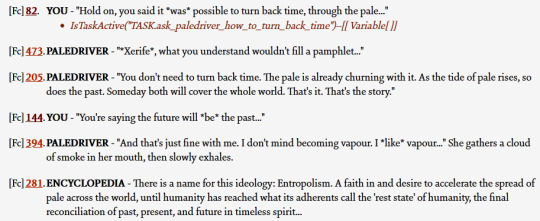
--and it has the potential to destroy everything--


and this is what moralism is. engels says of metaphysical philosophy:
In the contemplation of individual things, it forgets the connection between them; in the contemplation of their existence, it forgets the beginning and end of that existence; of their repose, it forgets their motion. It cannot see the woods for the trees.
by understanding the world in repose, as a dead thing, moralism is killing it. by discarding the past it is creating a debt that can’t be repaid. and what brings this all together is this bit of information from the game’s concept art:
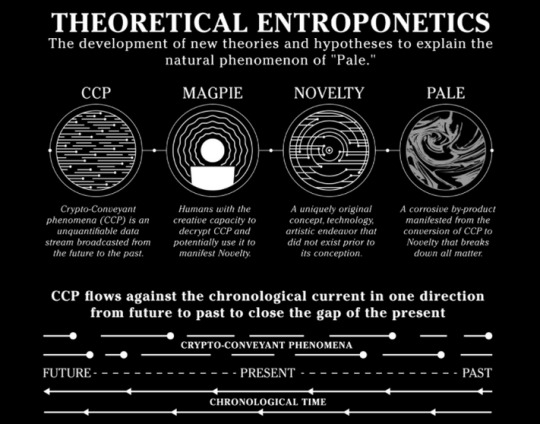
innocences create the fucking pale. what they’re doing, their immanentized personificaton of the kingdom-of-reason model of history, is destroying the future. very literally, the non-dialectic view of the status quo--the quest for the right ideas to ensure endless stagnant stillness--is killing the world. the man who killed dolores dei was right:

we were supposed to come up with this ourselves. so--all that done--what’s the point of this post? what do i think any of this proves, other than that i and the DE writers are fancy communists who read books? well, my read on it at least: the pale is the destruction of history for a purpose--because if we do not understand history, we will think we cannot change it. we will wait for the great people to do it for us--we will wait for them to invent a future to live in and we will wait until we die. we are supposed to come up with this ourselves. as engels says:
The possibility of securing for every member of society, by means of socialized production, an existence not only fully sufficient materially, and becoming day-by-day more full, but an existence guaranteeing to all the free development and exercise of their physical and mental faculties — this possibility is now, for the first time, here, but it is here.
liberalism tells us that the future is unknowable, untouchable, that all we can do is wait for it to arrive. socialism--and disco elysium--tell us that the future is here, now, that everything we need to build it ourselves is already in the world. the second hardest part of that is realizing it--the hardest part is doing it.
[i am dragged bodily out of the theater by my ankles, frantically snatching snacks out of other people’s hands as i go. for the road]
#disco elysium#marxism#this is NOT comprehensive or well structured i just had to get these thoughts out in writing or id explode
909 notes
·
View notes
Text
We've been having a conversation in my science fiction class about science fiction as allegory, and I've been thinking a lot about it as both metaphor and not-metaphor.
So, in Doctor Who, the Doctor regenerates. This is very clearly a metaphor for a normal human experience: "We all change, when you think about it. We're all different people all through our lives. And that's okay, that's good, you've got to keep moving, so long as you remember all the people that you used to be." This is also very clearly an alien experience to which none of us can relate. There is no human equivalent to having your entire body rewritten in every cell, becoming a new but same person with a new but same personality, and retaining all of your memories of someone you no longer are. Like. It's weird! Regeneration has to function as both metaphor and not metaphor at the same time, and a lot of its power as a narrative device comes from that flexibility.
My other example is mutants in X-Men (because X-Men and Doctor Who are the only two science fiction works to ever exist <3). The mutant metaphor is a long-standing part of the X-Men story, from God Loves, Man Kills to the cartoons to the movies. Mutation is a metaphor for difference; they talk about workplace discrimination, about government surveillance of mutants, about screening for mutant genes in utero. It has always been and will always be in part a metaphor. It is also a category that is extremely unlike any existing category. Some mutants are inherently a serious threat, some mutants are genuinely horrifying and disgusting, some mutants defy long-established notions of what it means to be a "person." And stories about the X-Men have to grapple with that as well as with the metaphor. Treating it purely as a metaphor misses the point, treating it as not at all a metaphor misses the point, you have to understand it as both at once.
49 notes
·
View notes
Text
watched 1x14 nightmare today. so there's this moment in that ep that everybody talks about, at the end. this one:
SAM: Well I'll tell you one thing. We're lucky we had Dad.
DEAN: (Looking astounded...and pleased) Well I never thought I'd hear you say that.
SAM: Well, it coulda gone a whole other way after Mom. I little more tequila and a little less demon hunting and we woulda had Max's childhood. All things considered, we turned out ok. Thanks to him.
DEAN: (Turning back to look at Max's house) All things considered.
it's a moment people pay a lot of attention to. because the thing is... dean's face falls, here. he's clearly put off by what sam's saying. he's bothered. and the common reading of that is that there was some degree of abuse more like max's that sam never saw. and that's like. that's DEFINITELY a legible reading of this episode.
however! i actually think this is a place where paying attention to authorial intent leads you interesting places.
so, first of all, what was the overall thesis of nightmare? i would argue that it's sam needs to stop being a pussy and whining about his childhood, some people have real problems. that's why the abuse max experiences is so cartoonishly bad, why the final conclusion is that max will always be miserable and is better off dead, why sam walks out of this experience more willing to empathize with john: the point of nightmare is that sam needs to learn that he could have had it way worse, that in fact growing up a hunter was the best option.
sam and max have a conversation in the middle of the episode that cements this point:
MAX: He blamed me for everything. For his job, for his life, for my Mom's death.
SAM: Why would he blame you for your Mom's death?
MAX: Because she died in my nursery, while I was asleep in my crib. As if that makes it my fault.
SAM: (Looking shocked) She died in your nursery?
MAX: There was a fire. And he'd get drunk and babble on like she died in some insane way. He said that she burned up. Pinned to the ceiling!
the point being made here is that sam is lucky. both mary and max's mother died in insane ways. john responded to this by accepting the insanity and getting obsessed with hunting demons. max's dad falls deeper into drink and blames max instead. this is the way to present the miserable demon hunting child soldier lifestyle as the better option.
(it's also useful to talk about how john was probably not intended to be perceived as an abusive father (though of course he obviously is, the writers just don't think anything that isn't what max went through counts as abuse); @restlesshush has a point she likes to make about how no one bothered to tell jdm that john's relationship with salmondean is fraught so he just doesn't play it that way.)
so now that we've established the overall point of nightmare, let's get back to the original point. now, i specifically want to talk about what i think the intent of the text is.
now, the basic formula of supernatural season one is that sam and dean get in an argument at the start of the episode, usually about their father, and it continues throughout. and when one of them fails to argue back, the other notices. look at this moment from 1x11 scarecrow:
DEAN: Sam. You were right. You gotta do your own thing. You gotta live your own life.
SAM: Are you serious?
DEAN: You’ve always known what you want. And you go after it. You stand up to Dad. And you always have. Hell, I wish I—anyway….I admire that about you. I’m proud of you, Sammy.
SAM: I don’t even know what to say.
dean fails to fulfill his narrative role, and sam notices. this is the same kind of things as when for example dean becomes more and more obsessed with clinging to sam because he has to in order to maintain the format of the show (i.e. two brothers). character flows from format, instead of the other way 'round.
and here, in nightmare, dean is unsettled by sam's change of heart, mostly because it breaks format, but also because, due to the format, sam (at least in dean's perception) has the character trait of "dad-critical" and it unnerves dean when this changes. that is i think as far as we can definitively say authorial intent goes. nightmare is a sam episode, so any deeper meaning is probably imo between jensen ackles and the fans.
but, if you'll permit me to go a little deeper than authorial intent while still using it as a baseline. here, in nightmare, the tendency to notice sam failing to fulfill his role becomes a lot more interesting. look at that scarecrow quote:
DEAN: You’ve always known what you want. And you go after it. You stand up to Dad. And you always have. Hell, I wish I—anyway….I admire that about you. I’m proud of you, Sammy.
dean's disquiet when sam fails to fulfill his role as john-critic is both intriguing and unsettling. it's layered. dean isn't just reacting to sam not following the script. he needs someone to play the role of john critic in his life, because he can't do it. he is, consciously or unconsciously, relying on sam to do it for him. and that's why he makes that face outside the millers' house.
#spn#also the fact that nightmare and the benders are back to back proves that the writers weren't thinking too hard about child abuse
270 notes
·
View notes
Note
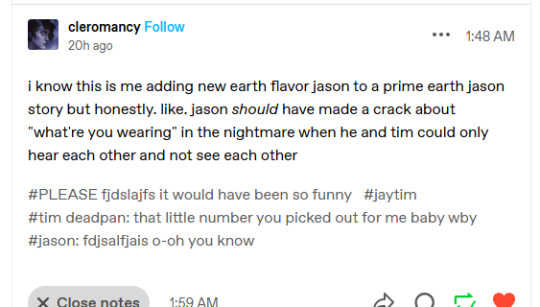
puts this on your list of things to do
Skcnwksks *adds another stone atop the mountain, and the world sinks another inch closer to hell
But okay fr. I actually read Knight Terrors: Robin today, and with the enormous grain of salt that I am working mostly with fandom osmosis, esp re: their established relationship, I think they alllllmost wrote something that worked. Almost. Long rambling nitpicks under the cut:
I think if they had about three more pages they could have established Tim and Jason's relationship and their problems with working together a little better; and either cut Babs out as the middle man who introduced their individual issues to the audience, or used her more effectively as a mediator.
They very clearly wanted to showcase two problems: Tim is working himself to death trying to save everyone, and Jason is suffering by insisting on working alone. Good! I like this concept. It's annoying to me that Babs is the one who tries to reach out to both of them about these issues, gets rebuffed, and then is never heard from again. I'd much prefer it if they tried to talk to each other on their own and it went poorly at first, only to be forced to open up in the nightmare realm. It would tighten up their combined arc if they'd had one single conversation before the Inciting Incident occurs.
Like, don't get me wrong. I am waffling about this because Babs is a good entry voice to help introduce our primary actors. She is the person they have in common, and by having her be the voice in their ear, we see that other people in their support networks are worried about them.
But man, why not just have Tim monologue to himself about being ready to wrap up his third bust of the night and consider hitting up Jason to see if he needs help on the intergang drug bust he's in the middle of. It could be on Tim's way to the next place he's going, demonstrating that he's stretching himself thin and looking for even more to do; even with people like Jason who he isn't all that close with. And then Tim and Jason have their own snarky conversation (with some veiled flirting) about not needing each other's help or each other's nagging, and that's when the nightmare mist hits.
Because the story is only tangentially about people other than Jason and Tim. They're both too wrapped up in their own problems to notice other people reaching out to them about their fucked behavior. So Babs could have been used as a yardstick for each of them - Tim dismissed her fears at first, Jason hung up on her outright - but only if she comes back.
If Babs had also been there at the end to check in with them, yeah, it might have lessened the impact of Jason's plea for help and getting only Tim in response, but it would have been the indicator that they were now ready to hear the worries expressed by their loved ones. A very *clear* indicator of what has changed in the narrative that justifies Babs' involvement in the first place. You could have her come in right as Tim and Jason are catching up after the initial plea, having just escaped her own nightmare (*editors note: see Babs' knight terrors issue, lmao). She could groggily direct them to someone who needs help. All three of them are working together now, Tim and Jason are on their way to opening up to more people; huzzah
And hell. If you want to justify why Tim knows stuff about Jason he shouldn't - or why Jason might know something about Tim that he shouldn't for that matter - a little extra time spent together in the nightmare zone is great for that. Make them see each other's worst memories. Make them see each other's defining moments. Make it the twisted, terrible, self-directed-blame version of events that exists in their heads, and then they can separately call bullshit.
You literally put them into a shared mind palace!! Why did Tim know that about Sheila? Because he just saw it in Jason's head. How does Jason know Tim has a savior complex too big to shoulder? Same deal. IMO, this would have made their insistence that the other person is better than they think much more natural. It's not an empty sentiment because 'I've literally seen what you think of yourself and I am telling you that it isn't true'. (They're in a shared mindscape. Why not imply that they are seeing what the other is seeing too. That they're having a shared experience and are privy to each other's thoughts, emotions, and memories? Easy to do. "I feel like I'm walking to class in the 10th grade...but when I was that age, I was 6 feet under." "And I'm positive I'm picking up ammo for a gun I don't own. I think it's safe to say we're sharing a dream.")
I'm also ??? about why the nightmare zone let them talk at all?? Maybe that's something that we don't have time to explain/ it doesn't need explaining, but if I were a terrible nightmare creature and I was menacing two people at once, I simply wouldn't let them exist in the same space. Isolation is key to breaking someone's will. If you let them talk to each other they could help each other. Fool. Buffoon. Literally the only reason to let them talk to each other is if you think they'll make each other worse lmao.
There was a clever visual trick in which Jason hits the void barrier and Tim sees the ripples he makes - but iirc that is the closest we get to an explanation of how they might be breaking through to each other. And it happened after they were almost done with their second conversation. Too little, too late, IMO.
Arguments could be made that they were able to break through because they were approaching a hard limit. Jason hears Tim again when he yells at his double to shut up, when Jason himself is just about ready to throw in the towel. The moment of deepest despair, the realization for both of them that they're not cut out to solve the problem with their current method. Something something, breaking the pattern - but why let them, unless the nightmare can't do anything about it? I do like a monster with a secret weakness, so I'm willing to let it slide now that I've talked it out lol but still. It feels like an unearned conversation when the only convo they had before was mostly exposition.
Anyway. Tldr; if the writers had a few more pages and shown us Tim and Jason's conflict with each other rather than water it down via Babs (OR BROUGHT HER BACK TO TIE IT ALL UP WITH A BOW) it would have been a tighter & more interesting story.
#wow that rant got a little long skxndbdjsj#anyway i think i want to own a copy of knight terrors robin now#i want it on my shelf so i can shake it around every now and then and remind myself of what we could have had#cause its honestly not the worst#it just suffers from being a spin off storyline without enough time to sufficiently set up its payoff#jaytim#also im still enamored by how that convo would go#jason: drake? is that you?#tim: jason? where are you? are you okay?#jason: not remotely. but first things first *coughs blood* what are you wearing
35 notes
·
View notes
Note
How much do you feel Zuko is to blame for his part in Ba Sing Se? I've seen people saying what he did there was never meaningfully brought up or addressed, so I'd love to know what you think.
Never meaningfully brought up or addressed?
It's a major plot point that heavily affects the narrative on multiple sides. It's also something that is telegraphed as something Zuko instantly regrets and will regret. It's a pretty classic pyrrhic victory, and part of the reason it's not continuously brought up like some of the other things Zuko did is because Zuko never gets to realize the benefits of it.


Even when he's being pampered back in the palace, even while his father is praising him, even while he's standing in front of a cheering crowd, it's pretty clear that he's not happy, that his victory in Ba Sing Se is based on a lie and something he knows he should not have done.
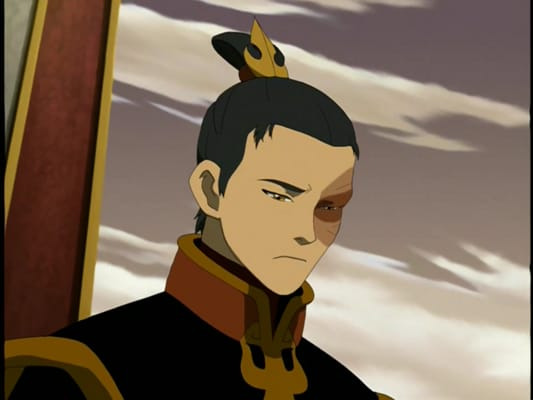
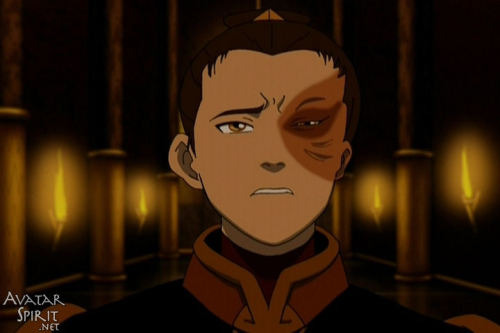

Ba Sing Se marks a turning point in Zuko's narrative that pretty clearly primes him for redemption, not just because he flirted with switching sides but failed, but because from the moment he chooses the wrong side, he knows, and everyone in the audience knows, that he chose wrong.
That's why it's not continually brought up or reminded to us that Zuko did a bad thing. Because he's already paid the price for it.
I've also talked a lot about how Zuko is manipulated by Azula, which doesn't negate the harm he does by choosing her side, but it does mitigate the gaang's understanding of why he did what he did and their ability to forgive him. Particularly with Katara, who is the person who does continually confront Zuko with what he did in Ba Sing Se. She gets the last word the first time Zuko tries to join the gaang and is rejected, and then specifically brings up Ba Sing Se to the others, and they agree with her, all except Toph.

Katara brings it up again twice after he's accepted into the gaang. But the reason she brings it up is not because Zuko needs to like, do reparations or something, or be continually punished for something that he felt bad about the instant he did it. It's because she can't trust him again after having her trust betrayed before.

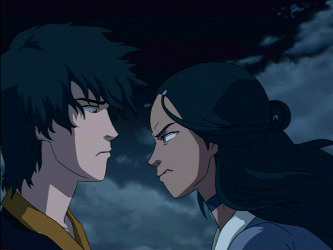
Which is why the focus is more on Zuko earning back Katara's trust, and Katara coming to understand that Zuko has genuinely changed.
Katara also comes to understand that Zuko was manipulated and that if he didn't side with Azula in Ba Sing Se, he would have been brought back as her prisoner. This is important for Katara as it relates to her arc with Azula and how that relates to her arc with Zuko. I'll never get over talking about how these three characters are intertwined. Katara goes from having to fight Zuko and Azula together in Ba Sing Se, after feeling betrayed by Zuko and not understanding why he sided with her, to protecting Zuko from Azula when she comes back for him at the Western Air Temple, and finally joining him against Azula, warning Zuko when she realizes Azula is trying to manipulate him again, and finally saving him from her.
Same with Zuko's arc with Iroh and how his betrayal at Ba Sing Se is about accepting Iroh's forgiveness, not about the specific actions he did. It's about Zuko needing to accept that he could be forgiven for his choices just as much as it is about atoning for them, so continually bringing it up as a mark against him would be pointless.
As far as him atoning for the specific actions, I think saving the world should be enough.
There's also the (neglected) parallel of Zuko and King Kuei as leaders that is established in "The Earth King" episode, with Zuko dreaming of being on the throne while being manipulated by a dragon with Azula's voice and not being able to make a decision, while King Kuei's inaction leads to the fall of his city and Azula using the Dai Li to take control. Zuko becoming the leader of his nation and ambassador of peace to the nation he helped to conquer definitely has a symmetry to it, and I think both of them work together and learn from each other post-series.
I've said this repeatedly, but what a character did in the past matters less than whether they've stopped doing bad things and are not motivated to continue doing those things. Once Zuko has proven himself as on the side of good, and once the characters who were personally wronged have already forgiven him, why would it need to be continually brought up?
As Toph points out, there's a difference between holding someone accountable and letting hurt feelings get in the way of making progress towards a greater good.
119 notes
·
View notes
Text
Would Non want this?
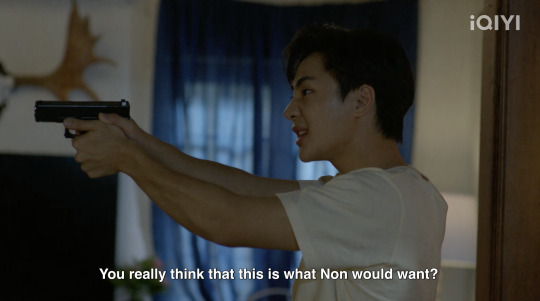
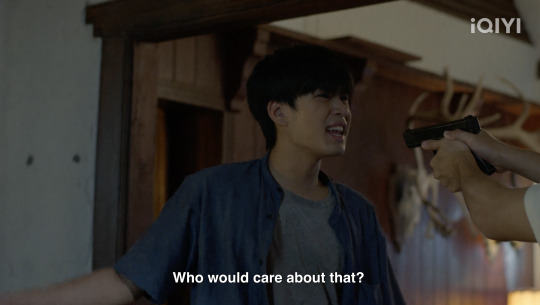
This question has been echoing in my head, ever since I made the post about New disregarding what Non might want. To me, that was a really damning moment in the narrative for New, because it puts him in a long line of people who have used Non for their own ends, for their own gain. It shifted his goal from "righteous revenge" to "selfish revenge" and since that put him in line with everyone else who didn't care about Non's agency or his desires, to me it marked him for death.
I've heard a lot of responses to that, including "revenge is always inherently selfish so that doesn't change New's character" and "Non is dead so what he'd want doesn't matter." And I disagree. Because narratively, what Non wants does matter. It's half the point of the show, that Non wanted to stay involved in the movie, didn't want to give up his script, that people pushed him around and framed him and coerced and manipulated him - stripping him of his agency at every turn. Even the people who thought they wanted the best for him (Phee, Jin) pushed what they wanted onto Non.
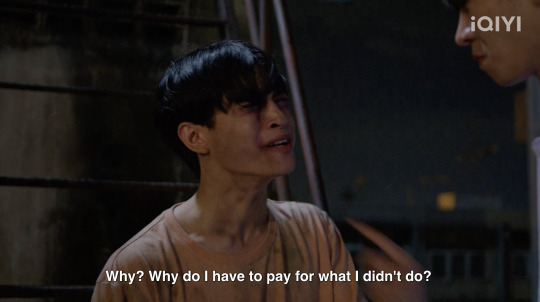
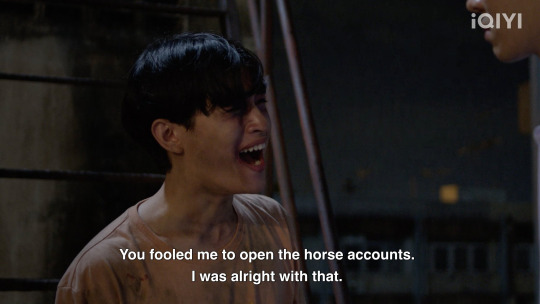
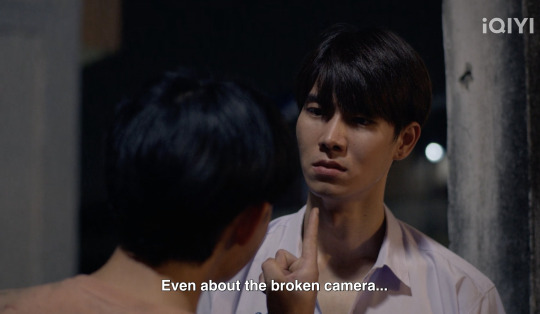
So even if Non is dead (and I'm not convinced he is), yes his agency and what he'd want matters. The problem is, of course, that we don't know what he might want.
We can speculate. Because of course, Non wrote the script, condemning everyone to die. He brought a knife into the woods, intending to use it to murder Por, Tee, Top, Fluke, and Jin.
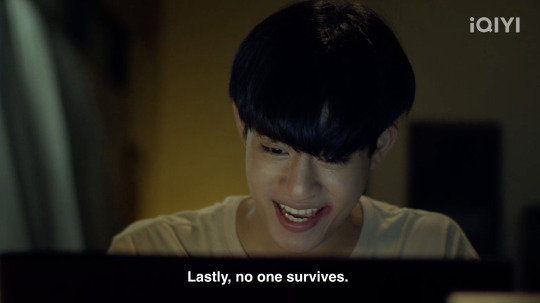

But despite this, when push comes to shove, Non backs down. When Jin darts forward to apologize, Non lowers the knife. Despite the fact that Non wrote Jin's death into the script, and crossed out his face along with the others, Non couldn't kill Jin even in the midst of his psychotic break.
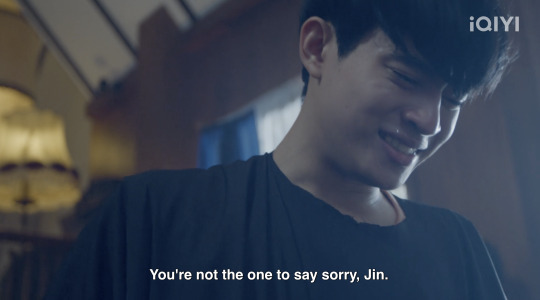

Yes yes I know Non didn't know what Jin did to him, but despite that, Non had clearly decided Jin was guilty by association, but he couldn't pull the trigger.
In the further flashbacks, when we see Non working with Tee to repay Uncle Joe, we also see he has a note that he keeps nearby to motivate him. And that note says nothing about revenge. Non simply wants to get out and move on with his life. He also has Tee right there in front of him, and doesn't try to kill him. He hits Tee's chest, but even that is pathetic in comparison to pulling a knife on him before...
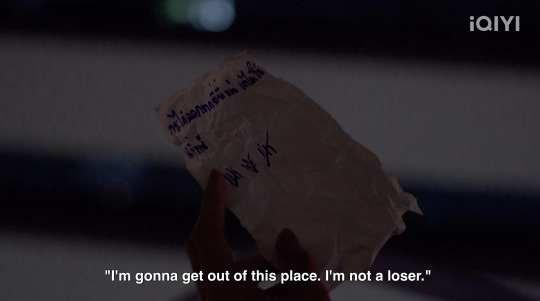
So all of that leads me to believe that Non didn't want revenge. He wanted to move on with his life. He didn't have that kind of violence in him. He was a gentle kid at heart, pushed to the breaking point.
But for the sake of argument, let's say Non DOES want revenge. Let's say that he wants the group of friends to die for their crimes. Because he very well might.
I think some people are missing some crucial pieces of information here. Because while Non might want the group to die, I don't think that would extend to Phee.
Non loved Phee. They broke up. And even if Non viewed Phee sleeping with Jin as a betrayal (and he might not, since they broke up AND there's some muddiness there because of Non sleeping with Keng - don't come at me, it's coercion, but the narrative establishes that Phee views it as cheating, so that's why I mention it) - he might not want Phee to die for it!

Non might not want the person he loved to die a bloody death because of his mistakes. Even if he hated Phee for sleeping with Jin. That might very well be too far for the boy who hated feeling like a burden on the people he loves.
But okay, let's assume Non DOES want Phee to die along with the others. He might not want his older brother to be the one doing it.
As I said above, Non hated feeling like a burden. He hated the idea of people inconveniencing themselves because of him. Do you really think he'd like the thought of his older brother throwing everything away, his entire life, and now his future? Non might not want New, the last member of his family, to destroy himself that way. There's no one else to carry out that revenge for Non, but if Non weighed the choice between his brother having a successful future vs revenge...? I'm not sure what he'd choose.
There's a lot of complexities to the question of what Non might or might not want. And while I personally think he wouldn't want revenge, because Non was at his heart a gentle person until he was pushed to the absolute brink... I think there are layers to the revenge that he may or may not want. And I think that desire matters, and it frustrates me that people are once again taking Non's agency out of the story.
#disclaimer that you're totally allowed to want revenge#i don't particularly care if people want everyone to die#I just don't like the narrative that what Non might want doesn't matter#because it DOES#and saying it doesn't just feeds into the narrative of the story#taking his agency away again#taking his choice away again#just another way to victimize him instead of respecting his choice#idk like I said you can want what you want#just don't justify it through Non#dff#dead friend forever#dff the series#non dff#dff spoilers#dff meta#dff analysis#new dff
40 notes
·
View notes
Note
Do you think Wish would have been better if they kept the concept of romance between Asha and the star boy, and the kind and queen being a villainous couple?
TL;DR...maybe.
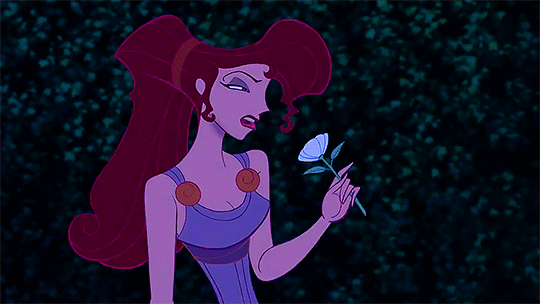
I admit, I do really like human!Star and Magnifico/Amaya being a villainous couple as concepts -- but I don't think adding those ideas alone would've fixed Wish's shortcomings. Because I strongly believe the main reason so much of the Wish fandom has latched onto the idea of a romance for Asha in particular comes down to people feeling more for their mental AU concepts of Asha and Star than for Asha and the rest of her canon cast in the real finished product. There are no relationships in Wish -- ones featuring Asha or otherwise -- that I feel really prompt much investment or emotion in the audience.
Asha's mom and grandpa really don't have much time devoted to them, especially early on when we could establish some real history and pathos in their relationships with Asha. (Positive examples of this would be Ember and her dad in Elemental, Tiana and James and Eudora in The Princess and the Frog, or Mama Coco and Miguel in Coco.) We never even learn Asha's mom's dream even though it's picked up multiple times and the narrative makes such a big deal about Magnifico crushing it.
The few lines discussing Asha's deceased father could've been cut from the story altogether and we would've lost nothing.
Asha's friend group gets so little focus as individuals that it's hard to even remember most of their names. They were clearly envisioned as just "the Seven Dwarves but as teens," and honestly, them being vaguely like the Dwarfs is the only real impact they leave on a lot of people by the end. Or did a bunch of kids that went to go see the movie beg their parents for dolls of Simon and Bazeema after the movie was over?
Asha and Star's dynamic can't be that interesting because Star doesn't spark any real character growth or change in Asha, nor does Asha really bond emotionally with Star. Star honestly just floats around looking cute for most of the movie, rather than doing that much of consequence.
Valentino doesn't provide any significant emotional support for Asha, the way that even other cute Disney "pets" like Pascal or Pua do for isolated characters like Rapunzel and Moana. He also doesn't advance her journey in any meaningful way like Sebastian or Jacques and Gus do for Ariel and Cinderella, respectively.
Asha and Magnifico's hero-villain relationship has no teeth because they have no real history prior to the events of the story (unlike Ursula using Ariel as a way to get back at her father Triton or Mother Gothel raising Rapunzel in isolation in an attempt to use her hair's magic to keep her young) and they don't serve as any kind of narrative foil to each other (unlike Jafar, who like Aladdin also uses magic and deception to try to advance his own goals, or Scar, who like Simba at the beginning of the movie "just can't wait to be king" and is focused way more on the perks of kingship rather than the responsibilities).
Even Amaya and Asha can't have much of a relationship because there's no time set aside for it, and even if Amaya put in a good word for Asha with Magnifico, she didn't speak out on Asha's behalf after Magnifico vindictively cast her aside and really only decided to fight alongside Asha after Magnifico "went too far" by threatening Amaya herself (as opposed to, say, anyone else).
When my mum and I went to go see Wish, we came out of the theater feeling oddly blase about the whole story. My mum even -- upon me asking her about her thoughts on this topic before I sat down to write this -- admitted that although she "wanted to see evil defeated," and all that, she honestly just hadn't cared about any of the characters that much. She wanted Magnifico to lose because it was justice for Magnifico to lose -- not because she was actively rooting for Asha, her friends, or Rosas overall. She wanted good to triumph and evil to fail, but none of the characters and their relationships had made her that invested in seeing how that came about. And considering that every single character in every story ever written is largely shaped by the relationships they have with other characters, that means that Wish's primary failing is not a lack of romance, either for its main lead or its villains --
It's a lack of love.
Any kind of sincere, selfless, development-inducing, chemistry-fueled love. Not necessarily romantic love -- Disney's Revival work has actually shown just how diverse love can be through films like Zootopia, Encanto, and Frozen -- but real love between the characters, built on the back of history and camaraderie and meaningful screen time. Love that adds layers to their personality, fuels their choices and actions, and ultimately helps them bloom into better, more complete people. Instead I would argue that the only "love" in Wish is with ideas from past Disney projects -- that's why there are more Easter eggs and overt meta references to other projects in this movie than there are scenes that actively stir your emotions. You know -- the way Mulan does when she decides to steal her father's armor, or Marlin does when he gingerly picks up Nemo's cracked egg in his flippers and cradles it, or Cinderella's stepsisters do when they rip apart the dress the mice made for Cinderella, or Pinocchio does when he watches in horror as Lampwick turns into a donkey, or Tarzan does when he comforts Kala after he comes out dressed in his biological father's old clothes and she starts to cry.
The reason a lot of fans love these two ideas -- villain!Magnifico/Amaya and human!Star/Asha -- so much is because these two relationships, even just in concept art, prompted more emotion out of them than any relationship in the entire finished film.
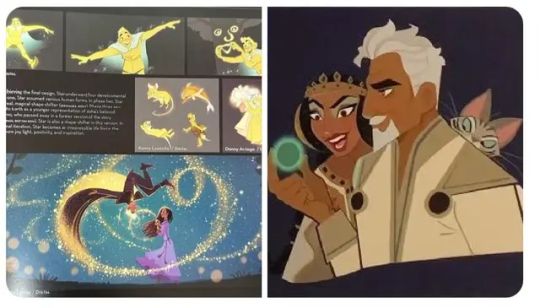
Perhaps if that same level of emotion was brought out in these relationships in a real movie, that would've helped, but only if the rest of the film had also been trimmed down and edited so as to help tell a story with those two elements. Slim down the overstuffed cast. Have Asha's family actually have a point, or cut them. Give Asha and Magnifico some sort of real history and/or compare-contrast dynamic. Develop Star as a character. Give both Star and Asha character arcs. Make the music more essential to telling the story.
Without a lot of additional changes on top of those two concepts being used, I think the ideas of a hero and villain couple would've only just made the list of ideas that were only half-baked in the final product longer. After all, if Star was Asha's love interest, you'd still really have to have good writing and a lot of chemistry between the two characters in order to sell your audience on a love story between them. Not saying it can't be done -- Tangled and Elemental both did it quite well -- but just throwing the two characters together as is (namely, rather underdeveloped) and making them romantic partners by itself isn't enough. Honestly, I think a platonic or even familial-esque relationship between Star and Asha could've been just as powerful, if that love between them really came through. Just look at the bonds between characters like Judy and Nick from Zootopia or Miguel and Hector in Coco. Even keeping Star as less explicitly human could've been fine, if the relationship between them and Asha was strong enough. Stitch and Lilo's relationship is rock-solid in Lilo and Stitch, and Stitch isn't even remotely human. Even Soul did something kind of interesting with Joe Gardner and his relationship with 22 by giving them something of a mentor-student bond. Maybe a quasi-"young parent/child" relationship between Asha and Star could've even been interesting, if it was written well!
I do think both ideas had great potential in giving Wish more of an identity that could help set it apart from its predecessors -- I mean, we've never had a human character have a romance with a supernatural being or a villainous couple in a Disney animated film before -- but including them wouldn't have fixed Wish by itself.
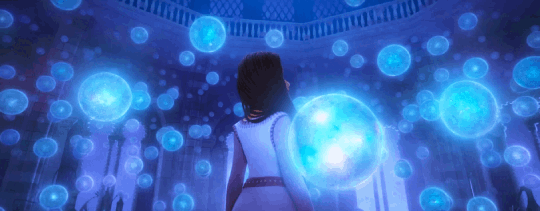
40 notes
·
View notes
Text
Bernard was NOT a close friend of Tim.
So ever since Bernard was brought back, there seems to be this notion going around that he was a super close friend of Tim or something. The writing keeps selling us this narrative and many of Bernard's "fans" seem to believe it as well. This write up will explain how this isn't true at all. Let's look at Bernard's appearances shall we?
First meeting: People like to cite Bernard's first meeting with Tim as "proof" of chemistry between him and Tim or Tim not giving off not straight vibes cuz of this:
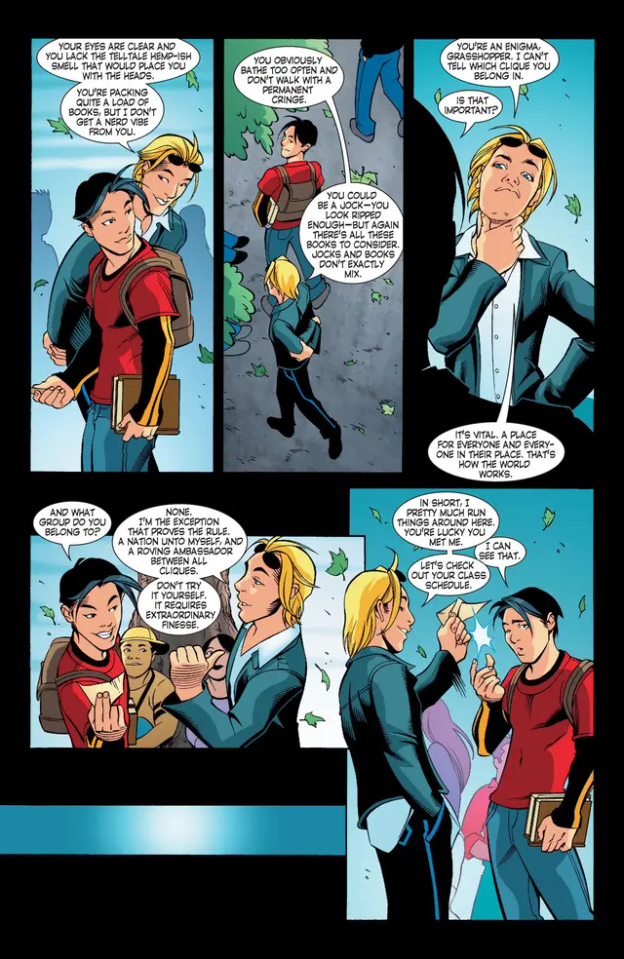
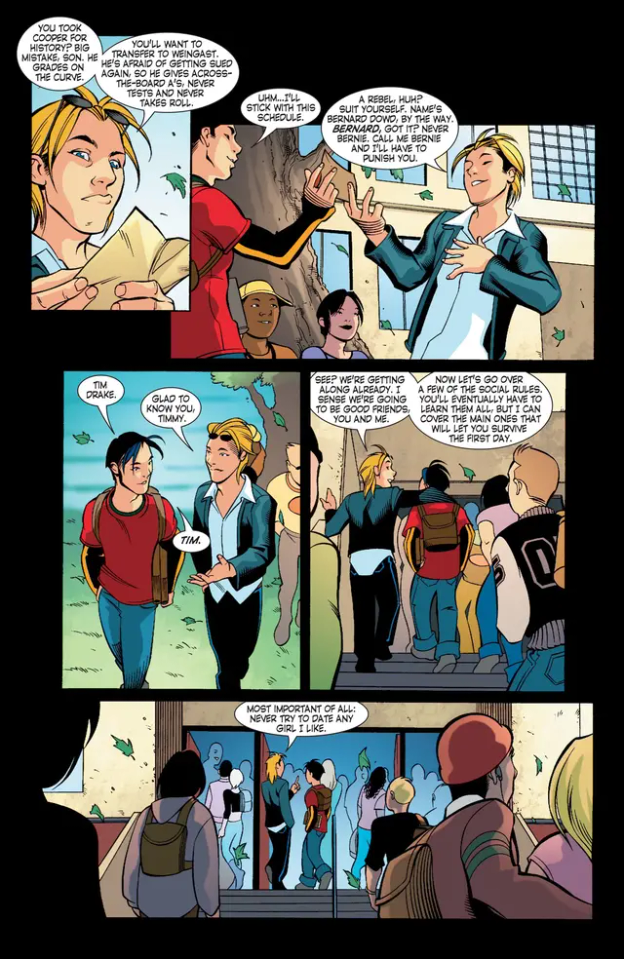
But they seem to ignore Tim thinking this instantly afterwards:
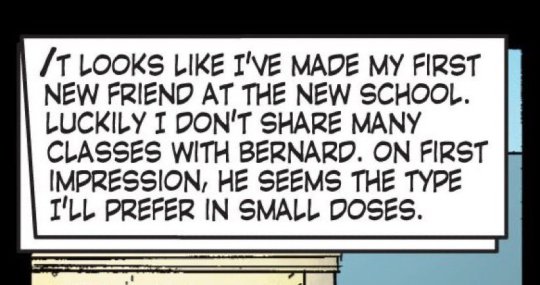
In other words Bernard did not make a good first impression on Tim and Tim clearly found him annoying/grating to be around and isn't too fond of him. You can see Tim starting to come this conclusion earlier when he says "I can see that", "Uh I think I'll stick with this schedule" and shooting down Bernard's attempt to call him Timmy. Tim was already starting to think he was sus. Even before these moments Tim is just doing basic stuff such as looking at him with a neutral look on his face, and barely saying anything to him with "is that important" and "what are you". These are just basic interactions. The idea there was any 'chemistry' here or Tim being attracted to Bermard let alone really liking him is just not true.
2. Tim saying he thinks he's going to end up liking Bernard.
This panel is often the most popular panel timber/bernard fans use to "prove" Tim liking Bernard and often they stop there in their past "evidence"
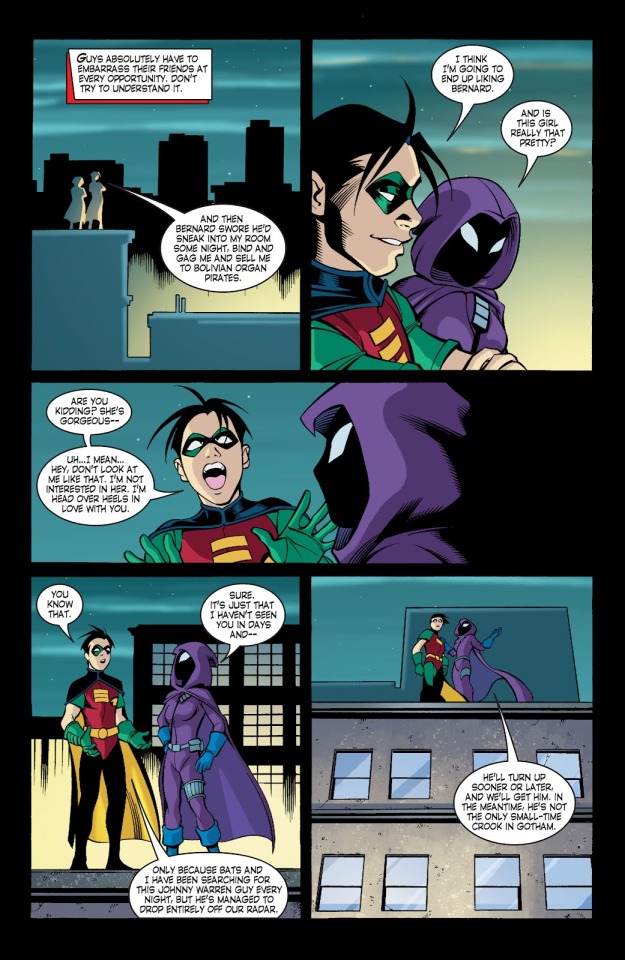
The context was this:
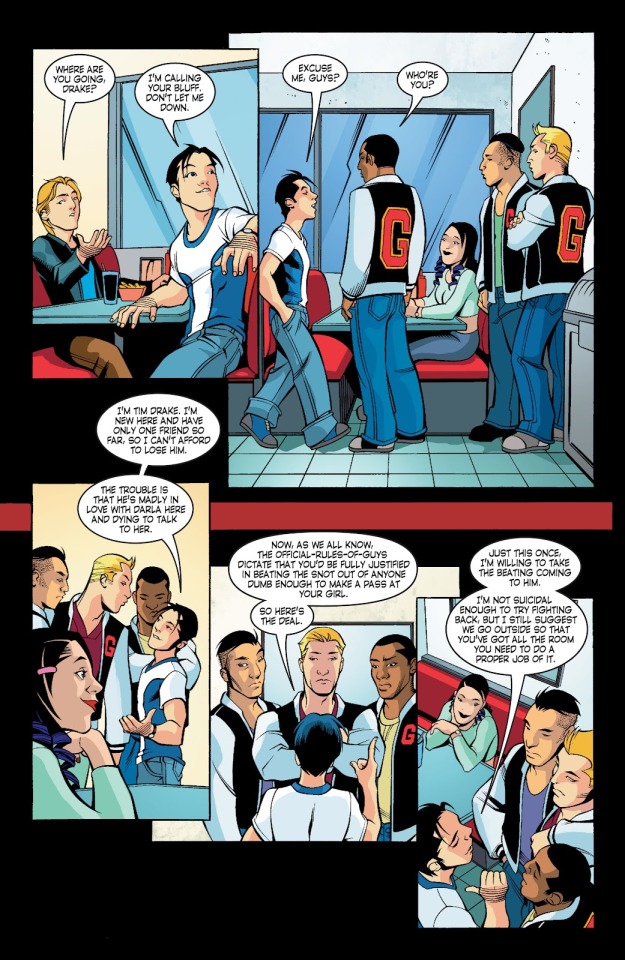

So tldr Tim embarrassed Bernard in front of Darla by calling his bluff on why he won't ask her out as part of a guy think of embarrasing their friends, and Bernard's reaction of 'threatening' Tim amused Tim
However this doesn't really prove they were close. Tim says he "THINKS" he's going to end up liking him not that he actually does, which reads more as deciding to give Bernard a chance rather than making the decision to like him fully. This makes sense given their initial meeting of Bernard not making a good first impression, Tim at this point hasn't known him for too long like a week, and this moment while funny isn't really a super bonding moment to establish a close friendship as at best it shows Bernard can take a hazing so he's not so bad but not enough to fully settle on a friendship. Tim mentioning him to Steph doesn't prove closeness for the reasons I said above and seems more about talking about a funny thing in his life rather than telling her about his new so-called bestie, which timber/bernard fans love to claim (notice how he doesn't really talk about Bernard as a person just the event surrounding it). Not to mention he also mentions Darla here as well and calls her gorgeous, so I guess by that logic she was a super close to Tim right?
Anyway this moment shows at best Tim is willing to give him a shot and re-change his intial view on him but trying to say anything more is pretty weak. Let's see what comes next (for the record this is the NCIEST thing Tim says about him)
3. Bernard teasing Tim about not being straight
So timber/bernard fans love to use this panel as proof of Bernard knowing Tim wasn't straight and they had some closeness
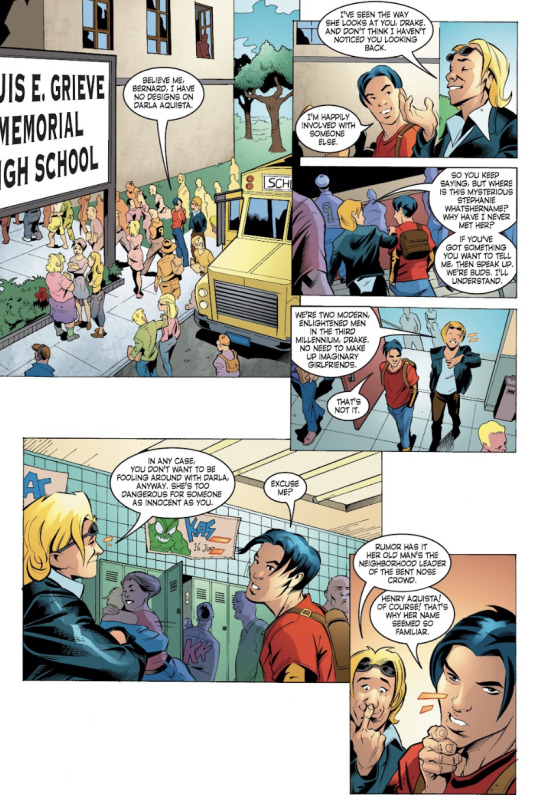
However if you pay attention you see it doesn't prove or show anything. Bernard's over the top and dramatic language clearly shows he's just messing with Tim. Not to mention his reasons for doing so are completely wrong. He saying it based on the notion that Tim is pursuing the most popular girl in Darla and doubts about Stephanie due to not meeting her. However as we know Tim was in a relationship with Stephanie and that is why he wasn't pursuing Darla. So if Bernard thought Tim wasn't straight due to this, he is completely off base. Not to mention this scene isn't Bernard trying to be a 'safe space' for Tim but like I said clearly just teasing him and at most going 'please tell me, I wanna know, I promise I won't laugh, tell me, tell me" where someone wants to know something just for the sake of their own curiosity than being a secret keeper. But again it was just teasing. Let's also note Tim didn't really seem too amused by by the teasing as his facial expressions show slight annoyance and brushing it off.
4. Bernard and Dana
Now this is something timber/bernard fans often ignore as it pretty much is the start of the tearing down of bernard being a close friend of Tim
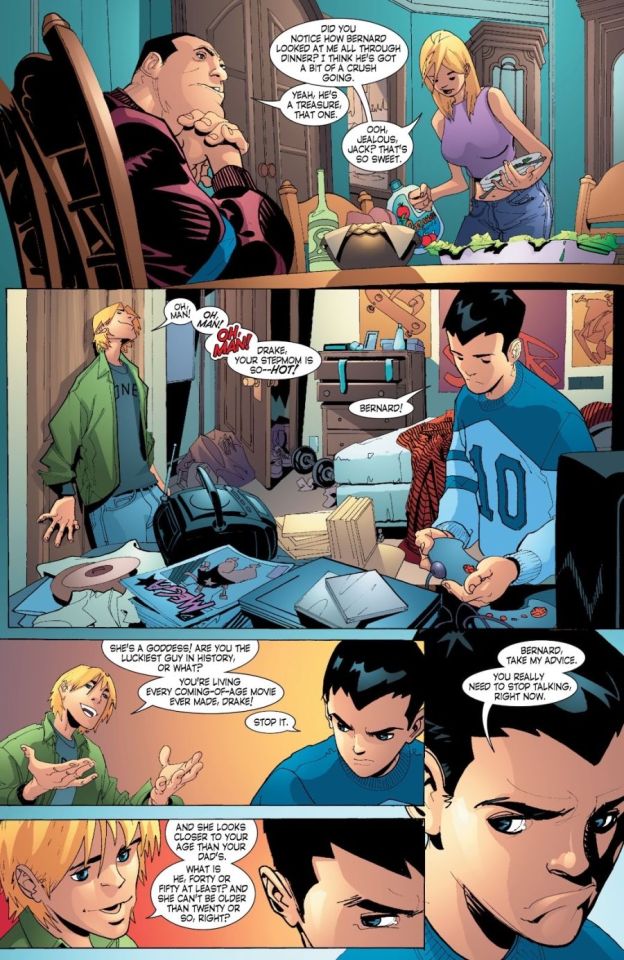
Yeah. I mean timber/bernard fans try to sugarcoat thinks by focusing on the fact bernard was invited to Tim's house in the first place. However they seem to ignore the fact that the main focus is on bernard making rude comments about Dana that clearly upset Tim instead of a main focus showing their "friendship". Ignoring this to focus on the background fact of bernard being there is disingenous. Not to mention Tim's discomfort isn't really played for laughs like you'd normally expect such as for example him being embarrased, saying "dude!!!!" in an over the top way or anything. Rather we see Tim getting visibly angered and calmy restraining himself from doing somethiing that he might regret. Bernard's comment really struck a bad nerve with Tim. This might explain the next few interactions where Tim's annoyance of Bernard is more emphasized
5. Bernard's conspiracy theories.
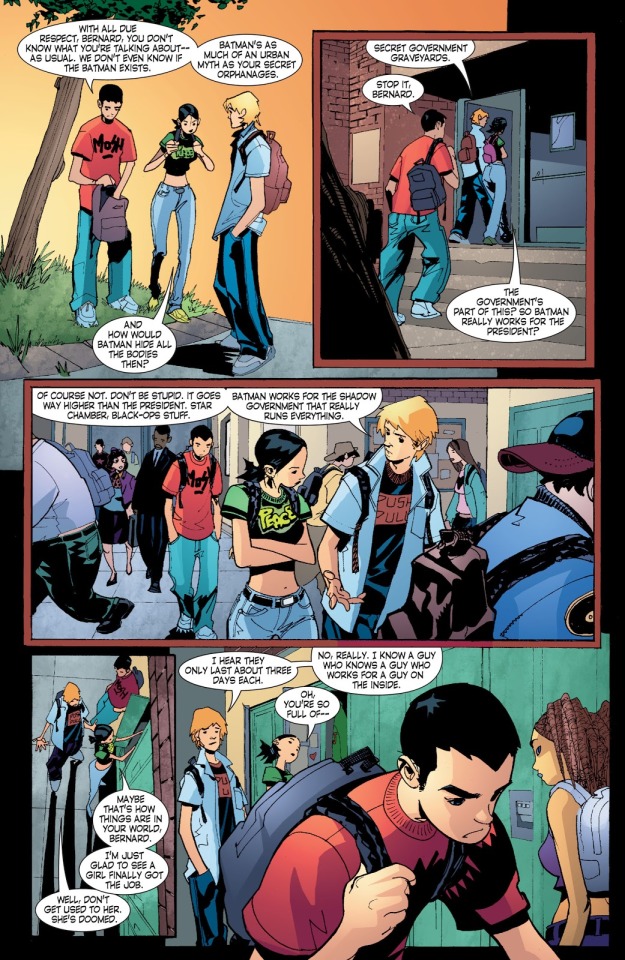
Here we see Tim getting annoyed by Bernard's conspiracy theories regarding the number of Robins. While part of the dismissal is due to Tim wanting to keep Batman an urban legend per Bruce and also not being pleased that knowing Steph is Robin, there is also a legit dismissal here. Notice how he says Bernard doesn't know what he's talking about 'as usual' which indicates he in genera finds the conspiracy theory thing grating. There is also how Tim throws in that comment in a shade way via prefacing it with 'all due respect' which is what someone says when they are being frank and straightforward but don't want to cause offence (but like I said Tim does throw in a bit of shade) there with the pause before 'as usual'. If Tim was just doing the normal friendly writing off he would have just straight up said Bernard was full of it like Darla, but the fact he does it through the filter of 'with all due respect' shows he does find the conspiracy thing genuinely annoying. There is also how despite Darla also engaging in the talk as well Tim only tells Bernard to stop talking (and not in an over the top exagerrated manner which shows legit annoyance), showcasing he was the prime focus of his annoyance and after Bernard said Steph is doomed is what caused Tim to walk away. Once again the emphasis is on Bernard annoying Tim and in a legit manner.
6. Darla seeking out Bernard to find Tim
So this is Bernard's last appearance before UL actually
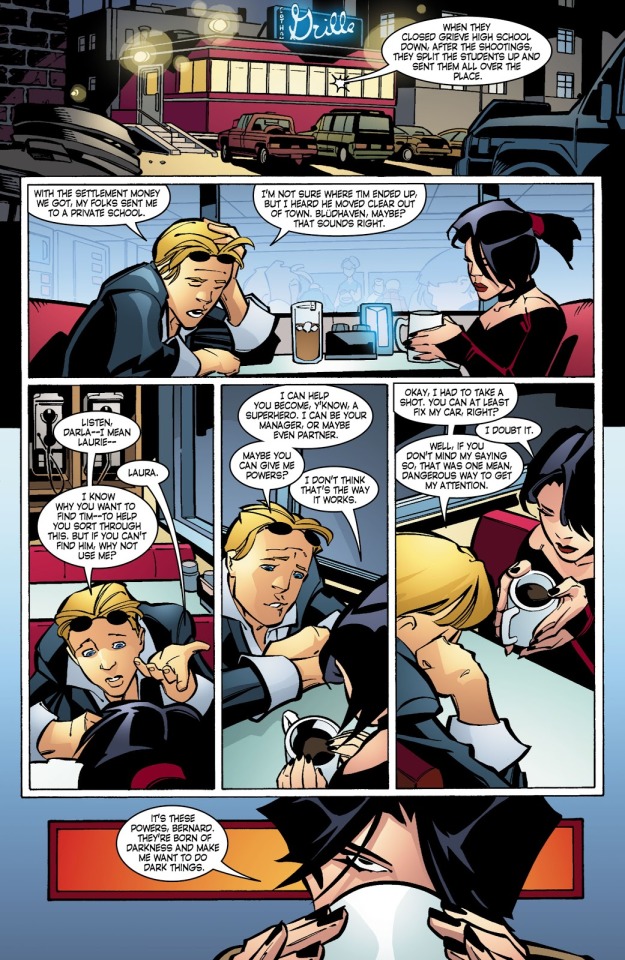
so timber/bernard fans like to focus on Darla seeking out bernard to find Tim as 'proof' of a close friendship. However as the scene shows bernard didn't know exactly where Tim ended up, only hearing about him maybe going to bludhaven and that's it. This shows Tim didn't tell bernard he was leaving and didn't keep contact with him. Before when leaving for Keystone or Brentwood, we saw/heard about Tim telling Ives, Callie, Hudman, etc but not with bernard. This also isn't a case of him just dropping off the radar like in RR which may justify bernard not knowing as the fact bernard even heard about him moving away shows this. Tim just didn't tell him or say goodbeye and when we see him leaving doesn't even think about bernard. There is also how bernard doesn't even seem to miss tim or even be worried/concerned about him, which you might expect given his father was murdered and everything which happened with the shooting. Compared to how when Ives and Zo didn't know where Tim was we saw/heard about them being worried.
Now to the final point.
7. Tim's final mention of Bernard prior to UL
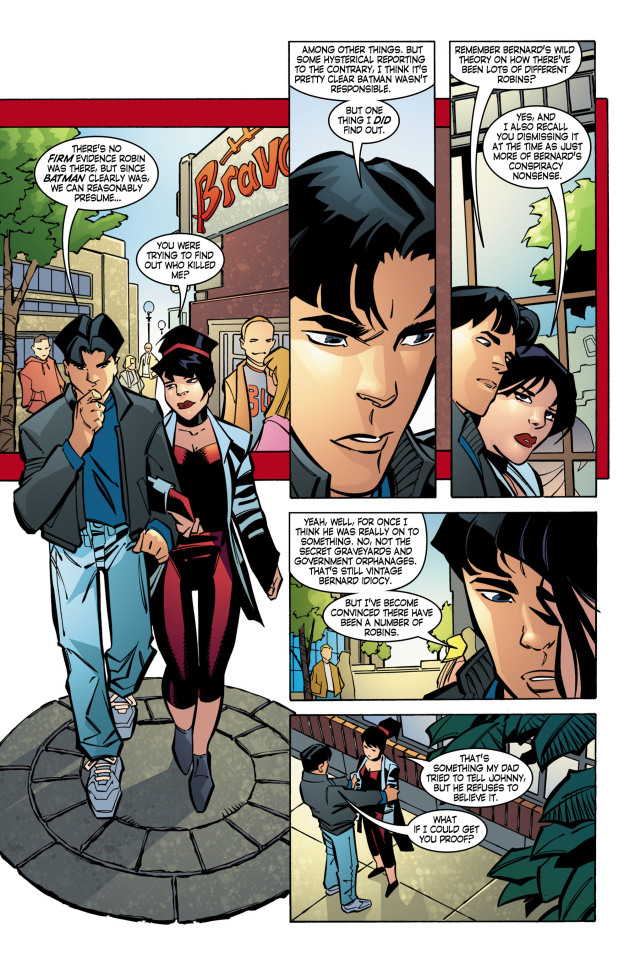
Here is the final time Tim mentions him....and here he says he's an idiot. People try to play this off as "friendly" teasing/guys being casual jerks to each other" or "friends call each other idiots" but look at the context. Here this is behind his back which refuts the guys being casual jerks to each other as the whole point of it as guys do it to each other's faces to show how it isn't serious or mean-spirited. Not to mention this is after they lost contact. And Tim is doing it about the conspiracy theories which not only was he shown to find annoying, but Darla herself re-affirms Tim thinking it was nonsense which further shows this. It's also in the middle of a serious conversation of discussing Darla and her murder which doesn't seem to be the fit place for friendly teasing. Not to mention Tim doesn't wait to like say share a laugh with Darla over it or for her to respond, or even has a smile as he says it, which again might support the friendly teasing narrative, but like I said nothing of the sort happens. He just drops it in so casually.
There is also how he throws shade at him before doing it with his 'whole yeah for once', which is a backhanded compliment and before he says what he was right about, he goes into what he was wrong about. The 'vintage bernard idiocy line' was used to dismiss the rest of bernard's conspiracy theories about multiple Robins. He's saying the secret orphanage/goverment thing shouldn't be taken seriously as that is "vintage bernard idiocy'. In other words 'don't listen to that/take it seriously as it's just a good example which highlights the idiotic behaviour expected of bernard' or "don't pay attention to it as it's just bernard being an idiot as normal' or "because it's just bernard being his usual idiot self, we can ignore it" which isn't friendly at all nor what someone would say about a friend behind their back (which Tim has never done for his other friends) Notice how Tim said 'vintage bernard idiocy' and not the idiocy of his conspiracy theories, which is a sum about bernard himself. We also have good reason to think Tim does think it is idiotic is Robin and knows how it works and that is why he dismissed as idiocy not the notion of multiple robins (if he did that then we'd know he's playing dumb to protect his id, but again what he dismisses is the part we and he know is BS) and already by revealing there are multiple Robins Tim kind of playing it close to the fire.
There is also how the "vintage bernard idiocy" line talks about bernard being an idiot in general given how it means 'an example which highlights the usual idiotic behavior expected by bernard' and isn't a case of a someone calling a friend an idiot in the heat of the moment due to a specific action/context like Tim sometimes did to Kon or Bruce to Clark (and afterwards in the same issue we saw Tim/Bruce show moments of genuine care for Kon/Clark showing it wasn't meant to hamper their friendship). Tim was so calm and non-chalant about it, showing it was a calculated conclusion he made about Bernard. Not to mention if it was "friendly" there'd usually be something like "he's a loveable idiot, or he;s an idiot but my idiot, which is why I like him, etc" usually with some smile on his face or sometting which he has done with other friends but here not that. Again it was dismissal and he was doing it in a non-chalant manner
8. Conclusion
Ultimately Bernard just wasn't a close friend of Tim. At BEST he was a casual friend and at worst he was someone who Tim didn't think too highly of and found annoying. He was the friend you ditch after HS or the friend who you initially hang out with, but later realize the friendship won't work and just cut ties.
Tim's opinion of Bernard went from "I guess we can be friends but this guy is sus to "maybe he's not so bad and deserves a shot" to "nah forget this. He's not worth my time".
if timber/bernard fans could just acknowledge how he wasn't a close friend of tim and was retconned into one, it'd be fine but their attempts to insist he was just relies on wilful ignornance, deliberate misreadings, and making up stuff to convince themselves otherwise.
30 notes
·
View notes
Text
Haven't seen anyone talk about this so I will because to me it seems like the biggest obstacle in Rei and Kazuki's relationship and an important through line in the show.
Here comes a long, unpolished post.
As far as Miri goes, the family unit has been established and the two dads are settling in and relaxing into their roles almost a year into having Miri. Ep 7, 8, and 9 established that Kazuki, Rei, and Miri in that order respectively are in this family thing for life 100%.
But we still have 4 episodes left.
Obviously angst is coming, but along with that, Kazuki and Rei still need to address this barrier between them.
Listen to me. These lines from episode 3 have been nagging me since they were first said. They're IMPORTANT.

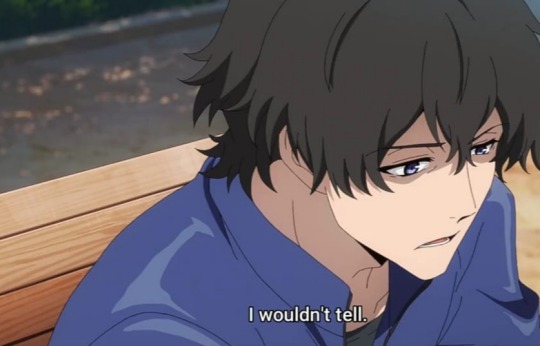
"I won't ask."
"I wouldn't tell."
The context here is Rei and Kazuki talking about their pasts. Whenever Kazuki brings up a tidbit about his past, Rei will agree if it also applies to him, but he will not elaborate, and Kazuki won't ask him to. Kazuki knows the gist about Rei's family. Who they are and what they do. He doesn't know how badly Rei was/is treated. He can see the scars. I doubt he's ever brought them up though.
"I won't ask."
"I wouldn't tell."
It's a constant in their relationship. But this lack of communication is problematic for two people who have decided to spend their lives together and raise a child.
Here's another example from episode 8
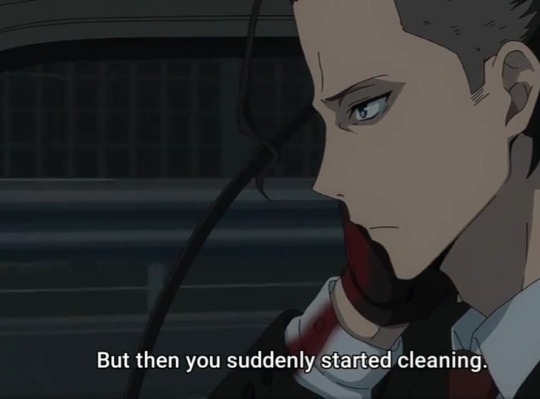
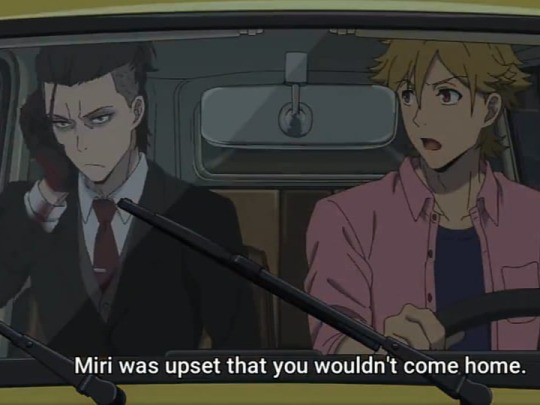
Rei here is bleeding from his forearm. The show even has him pose in a way to show us that it's clearly within Kazuki's line of sight.
But Kazuki doesn't ask. Because Rei wouldn't tell.
However concerned he may be, he doesn't bring it up. He doesn't know where Rei was that night or why he's injured. He can assume it had something to do with his family, which should be worrying in itself. Kazuki is endlessly patient and understanding, but that's not fair to him.
The show even makes it a point to bring this issue up again in the same episode:
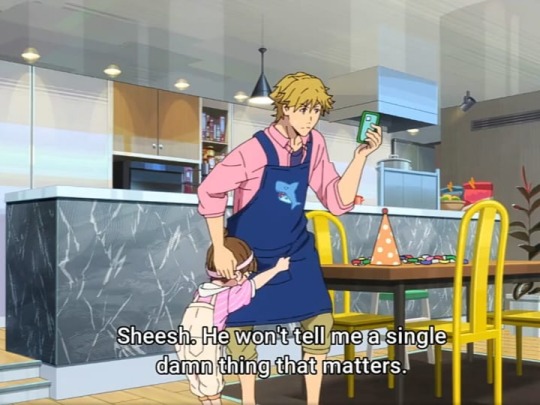
So where do we go from here?
There will need to be a moment in the show, where Kazuki WILL ask, and Rei WILL tell.
Or Rei will just open up on his own without prompting. What Rei will tell Kazuki, we don't know, but it'll be something that matters. Something important.
What could it be?
My predictions:
Rei opens up about his past abuse in detail to Kazuki to fully make him understand what his father is capable of (because of the upcoming danger)
Kazuki gives Rei some sort of ultimatum, which results in Rei admitting something, whether that's "I love you", "I need you", or some sort of confirmation that he has no intention of leaving Kazuki's side, not just Miri.
They just have a moment where they open up to each other just because they're simply changing and comfortable enough to talk about the past now. "You didnt matter much to me" is the closest we've gotten.
A "what are we?" convo.
Regardless of the reason, narratively it will have to happen before Rei and Kazuki can move forward with their relationship, whatever that entails. But this lack of communication and vulnerability with each other is what's holding them back.
Lastly, this may be completely unrelated because the show is set in Japan but still caught my eye.
"I won't ask."
"I wouldn't tell."
Sounds a hell of a lot like the old, "Don't ask, don't tell" policy in the USA, which basically stated that non heterosexual members of the military must keep their damn mouth shut about their sexuality. No openly queer people.
Which if we apply it to Rei and Kazuki's unclear partnership... Fitting.
And also considering Rei's homophobic ass speech about carrying on the family and Kazuki sullying Rei's blood (which literally implies he thinks they're sleeping together because the only way to "sully blood" is through sexually transmitted infections), seems like the organization might've also had a sort of, don't ask don't tell policy.
I'm sure I've missed stuff, but these are the points that have been stuck in my brain. All in all, whatever this important thing that Rei will tell Kazuki is, it'll be the catalyst for taking their relationship to the next level of "partnership."
#buddy daddies#suwa rei#rei suwa#Kazurei#unasaka miri#Also please let them show some sort of physical affection toward each other after#Is a hug not reasonable and appeasing to everyone?#Doubt it'll get romantic since the title is called BUDDY and this is Japan and it's not a BL#I can dream though#Clown
351 notes
·
View notes
Text
Ok so, I've been wanting to talk about the whole episode 5 recollection thing ever since we saw it on the previous trailers, and since there were more shots of it in the new one too I'm gonna take the opportunity...
So, in all the little shots we've seen, we have Louis going at Lestat. So I'm guessing the idea is that they're gonna make the """fight""" actually more of a fight and not just Louis getting beaten.
Personally, I am pleased with this, because I think it's basically the best way to deal with this whole mess. I never had an issue with Lestat and Louis "fighting". What I have issue with is how extremely violent it was, how Lestat actually seriously hurt Louis. If it had been just a punch or two (though that would already be domestic abuse) I wouldn't have been fazed, but his whole body was bruised and bleeding. There was a trail of blood when he got dragged across the street. He took months to heal. In their little "fights" (actually not sure if it's more than one) in the book, Louis was completely fine. Lestat never truly hurt him physically.
So, to sort of get into a writers mindset I guess, how could you "fix it"? Well, I don't think they could say it's a fake memory. I'm sorry but the idea that it was implanted by Armand for example is just ridiculous to me. I don't think it even makes much sense in the first place, but besides that, I hate the idea of just blaming Armand to make Lestat seem better. This black and white idea of one of them being the "bad boyfriend" and the other the "good one" that comes from both sides is NOT true to the characters imo, and I also think it's a shitty narrative to go with, storytelling wise.
Besides that, I'm not sure how else you could fully retcon it and say it was fake. I saw people theorizing that only the drop was fake, but again that seems to rely on the Armand fake memory theory, and I honestly don't think they'll retcon it since it was kinda the whole point thematically from what the writers said (that it's a parallel to Paul and that they were "very pleased with themselves" for it). And clearly the initial "fight" is not fake from the new shots we got. Obviously "Louis made it up" is not an option. I remember people talking about how it was from Claudia's POV, which I honestly don't remember whether that part was supposed to be from her diary or not, but even if that's the case the most that could do is establish that the details of the fall are messy because she wasn't there to see it, and that maybe Lestat wasn't so "triumphant" after it.
Lestat attacked Louis, just because he THOUGHT Louis wanted to leave with Claudia. He started it, which does matter imo (I don't think they can change that to it being Louis) and it was completely unequal. I know this fandom is lowkey plagued with gender role discourse, but Lestat, as a stronger vampire, has a huge advantage against Louis, akin to a man hitting his wife, but probably even bigger due to supernatural strength.
And that is to say, technically the main problems will probably still be there. Which is how it should be imo, cause after doing that they have to commit to it, at least to some extent. The idea should not be to fully exonerate Lestat, but to basically soften the blow (literally and figuratively) by adding some more nuance to it. The writers said themselves that they want Louis to be belieavable as a victim.
So, I'm guessing that what we're gonna see is Louis defending himself, getting some hits against Lestat, and that Lestat was hurt too, and maybe something new about the fall. Which honestly is gonna give me some peace of mind. I get why people don't like the idea of discrediting Louis' account of the event, and of how the fandom can turn on him if he's not some perfect victim... But there was (is) just something in me that can't fully ship Loustat as much as I did before with that having happened.
Like, for a while I have basically just chosen to ignore it as much as possible. I don't rewatch the episode, I skip it during reactions, I skip the beginning of episode 6 where we see how Louis is after. I have acknowledged it many times but more as like a meta thing that happened. I probably wouldn't say it's triggering, but it just crossed a line to me and I'm gonna welcome (almost) anything they do to make it less bad than it seemed, not because I want for Louis to come off as a liar or anything but just like... For my own relief, to kinda have a bit of weight off my shoulders when watching the show and shipping them? Obviously I don't know anything for sure and I might be wrong about some things I'm guessing, but not having it be so one-sided at least already helps a bit.
(Please don't come here to say I'm a weak bitch who can't handle dark gothic romance or some bullshit like that. I've already talked about that back when the scene aired and if you think it's a simple as that you're probably just dumb and insensitive)
#interview with the vampire#iwtv#amc iwtv#loustat#louis x lestat#lestat x louis#louis de pointe du lac#lestat de lioncourt#discourse#iwtv discourse
26 notes
·
View notes
Note
what did cicely neville do in edward iv's reign?
Hi! Cecily’s entire role during Edward IV’s reign is too long and complex to fully get into right now, so this is just going to be a very brief overview. It’s also not going to touch on her relationship with her daughter-in-law Elizabeth, even though that's somewhat relevant here in some aspects, because that’s also too complex and speculatory.
Ironically, despite the Duke of York’s claims to kingship, it was only after his death and during her widowhood that Cecily Neville truly emerged as a “quasi-queen”. After her son Edward IV had been acclaimed as King in London, and before he left for Towton with the other lords, he summoned the mayor and “all the notables of London” to gather and “recommended them to the duchess his mother”. During his absence, Cecily would preside over his household in Baynard Castle and was probably meant to act as his representative of sorts in the city. After his kingship was more firmly established, Cecily primarily resided at Westminster with him from 1461-64 and regularly accompanied him on several ceremonial and political occasions, such as their visit to Canterbury where she was magnificently welcomed. She also appears to have had a great deal of personal and political influence with her son: Nicholas O’Flanagan, the contemporary Bishop of Elpin, observed in the first few years of Edward IV's reign, his mother could “rule the king as she pleases.”
Cecily’s role demonstrably changed after Edward’s marriage to Elizabeth Woodville in 1464. She remained the second-highest ranked woman in the country, but she took a significant step back from high politics (a la Joan of Kent after her son’s marriage to Anne of Bohemia). That does not mean that either of them suddenly became apolitical or uninvolved: quite the opposite*. Cecily remained the head of a large household, her administration supported her son’s, she continued to support a few religious institutions, she engaged in trade, she launched court cases, and she clearly inspired loyalty among her affinity. All of this was fairly standard for a medieval noblewoman, but was naturally enhanced by Cecily’s own prominent royal status. Cecily was godmother to at least three of the royal children: Elizabeth of York, her namesake Cecily, and the youngest child, Bridget. She also played a role in reconciling her son George to the Yorkist cause in 1471, though she did not have the spearheading role which has often been erroneously credited to her by historians (ie: “engineering peace between her warring sons”); instead, it was her daughters Anne and Margaret who took the leading role in achieving the reconciliation, while Cecily probably aided them. She was also clearly perceived to be influential with Edward IV, best evidenced by how the mayors of Norwich petitioned her to aid them against the Duke of Suffolk in 1480, though we don’t actually know the result of Cecily’s intervention to judge whether it succeeded or how effective it was**. Regardless, though, she evidently had a much lower national profile during these years.
(On a more personal level, we also have a very sweet anecdote from Elizabeth Stonor who spoke of a meeting between Cecily and Edward in October 1476 at Greenwich: 'and ther I sawe the metyng betwyne the Kynge and my ladye his Modyr. And trewly me thowght it was a very good syght’.)
Cecily’s numerous titles are also interesting. Immediately after Edward IV’s ascension, she called herself “the Kyngs Moder, Duchess of York”. Variations of the title included references to her late husband, but she primarily defined herself in relation to her son, through whom her current position and power derived. As Laynesmith says: "narrative accounts, particularly chronicles, had naturally used the phrase ‘the king’s mother’ to describe women in the past, especially Joan of Kent. However, it was Cecily who turned this into a specific title in her letters and on her seals." A few months after Edward's marriage was announced, Cecily adopted a new title, now styling herself as: “By the ryghtful enheritors Wyffe late of the Regne off Englande & of Fraunce & off ye lordschyppe off yrlonde, the kynges mowder ye Duchesse of Yorke.” This referenced the Yorkist perception of her husband, Richard Duke of York, who was called the "true and indubitable heir" of England. In 1477, a herald for the wedding of her grandson Richard of Shrewsbury styled Cecily as “the right high and excellent Princesse and Queene of right, Cicelie, Mother to the Kinge”. This was once again linked to her husband’s status: Cecily described him in her letters as “in right King of England and of France and lord of Ireland”. All in all, Cecily’s various designations appear to have been designed to signify her own importance within the regime, to uphold the claim of her late husband, and to strengthen Edward IV’s position by promoting him as the son of the supposedly rightful heir. It’s also very possible, as Laynesmith has suggested, that “it was as her queenly power diminished [after the early 1460s] that her claims to queenship were more elaborately emphasized in wax and on parchment”.
Cecily’s role and prominence, and how it changed overtime, is best demonstrated by the number of times English subjects offered prayers for her soul in return for grants. Between June 1461 and September 1464, there are twelve instances of grants made to people who offered prayers for her. (To compare, during the first three years of Elizabeth Woodville's queenship, there were sixteen grants of the same type. So, Cecily didn't quite reach the level of the queen, but she came close; it was quintessential "quasi-queenship"). However, mentions of Cecily dramatically deceased following Edward IV's marriage: over the next 19 years till 1483, she is only mentioned five times, and in all cases Elizabeth Woodville was also listed before she was. Three of these mentions are in 1465, likely reflecting contemporary unease with her son's controversial marriage and the perceived unsuitable origins of the new queen. After that, however, Cecily is mentioned only twice: once in 1476 and once in 1481, with the latter being a grant to her own son-in-law Thomas St. Leger***. This fits well with what I mentioned above about her quasi-queenship in the early 1460s, followed by a much more reduced role and lower national profile in the future years.
Hope this helps!
*Oddly, Cecily is not mentioned at all in contemporary reports for her daughter Margaret’s wedding. Laynesmith believes that she was unwell, and that may as well be true, but Margaret's celebrations went on for a great period of time and it does seem conspicuous that Cecily was entirely absent from them all. It's also worth noting that a letter from the Milanese ambassador Giovanni Pietro Panicharolla on the marriage wrote that "the king, the queen, her father, and the king's brothers are all disposed to it" (sidenote: it's VERY interesting that the queen's father is mentioned before the king's own brothers and male heirs) but made no mention of Cecily. Nor, iirc, was she mentioned in the tournament held to celebrate Anglo-Burgundian relations. It does clearly seem as though Cecily did not play a notable role in the marriage, and relevant diplomacy, at all. (Laynesmith's claim that Cecily had "helped lay the ground for" the marriage because she *checks notes* dispatched both her sons to Burgundy in middle of a civil war 7 years earlier, with many fluctuations in Anglo-Burgundian relations in between, is, I'm sorry to say, nonsense).
** Laynesmith believes that "Cecily’s intervention to control Suffolk perhaps marked a turning point in the duke’s violent career because when he resorted to force again the following summer his victim successfully reclaimed the manor from which he had personally ejected her." I think that Laynesmith is being far too assumptive and that we don’t even know the result of Cecily’s intervention in 1480 to somehow credit her with entirely different case one year later that did not even involve her, lol.
***Even more oddly, Cecily’s own son Richard didn’t include her among the list for who to offer prayers for in his college in Middleham in 1478. This was despite the fact that he had included Edward IV, Elizabeth Woodville, his wife Anne, his sisters, his dead brothers and his dead father. It’s incredibly striking, and I wonder what could have happened to cause her exclusion, especially since she was included in religious foundations by both Edward and her son-in-law Thomas St. Leger? Laynesmith claims that "this rather suggests that Richard's own piety was not consciously influenced by hers", and sure, that seems obvious, but it certainly can't have been the only reason. Was she merely overlooked (unlikely), or did they have a quarrel at the time, or was it for another now-unknown reason? Whatever the case, it's a small but intriguing detail to me.
Sources:
"Cecily, Duchess of York" by J.L. Laynesmith
"A Paper Crown: The Titles and Seals of Cecily, Duchess of York" by J.L. Laynesmith (The Ricardian)
"Cecily Neville: Mother of Kings" by Amy License
27 notes
·
View notes
Text
SPOILERS FOR THE NEW DONT HUG ME IM SCARED STUFF
Everyone is talking about Lesley (Leslie?) as a literal puppet God. I have a different theory.
Batteries can be replaced,
But some things never change.
No matter how much we twist in pain,
We're still dancing in chains...
I believe Lesley is just as trapped and as much of a 'prisioner' as the main trio is. She clearly has a lot of control over their reality, but we know that she is not the last level of realization. There is still a staircase above her, yet this staircase doesn't lead to anywhere inside the house, despite it being a part of the miniature she has in her room. This might imply that much like when Yellow Guy first saw the staircases by realizing the inherent fakeness of his reality, so did she, but for some reason won't go up... Or maybe she can't.
"Did you build all this?"
That's a good question.
The main trio being characters of a TV show is pretty well established. There is symbolism all throughout the webseries and it continues here. Whether the TV show is Don't Hug Me I'm Scared itself, or a twisted kids program inside the diegetic reality of the show is hard to know. But in either cases, Lesley is still a character in the show. She doesn't know whether she built all of this or not, because it seems like she knows she's a character. Maybe in the narrative inside the show she did build it, but... It wasn't her, it was the showrunners, maybe she knows that. It seems like the book she hands Yellow Guy holds answers to their reaity too: They're in a TV show!
Lesley looks like the host of that TV show, a kids show, or an adults show, DHMIS itself. I predict in the next season she will return as exactly that, giving a little briefing of the adventure at the start of each episode. The next level above her is the reality of the show being produced, maybe it's our reality, maybe it's something way worse...
430 notes
·
View notes
Text
This is a somewhat-hingeless rant about disability and OFMD/Izzy takes.
Tumblr handed me a "recommended" post that made me so mad I ended up deleting a moderately unhinged reply and walking away for a bit. It's still eating at me, so I'm just gonna reply to it indirectly.
(I know this is cowardly, but anything I say will just lead to fighting and I'm tired. If anyone wants to discourse about whatever I post, please do me a favor and don't rant at me directly. Take caps and scream into the void like a gentleperson.)

First: I am physically disabled and I often use visible disability aids (just establishing my credentials so I'm allowed to not support this take uncritically). I also have mental health issues and less visible physical issues that honestly cripple me more.
Second: the title alone, man. My main issue with this whole thing is the disability gatekeeping, but that interpretation... hngh. I don't think OFMD was trying to meet a disability quota, you know? It's not "we have three disabled people so we can kill one off."

"Izzy shouldn't have died because he's the most clearly, visibly disabled" is a weird take because it conflates two unrelated things: Izzy's disability and Izzy's death. It's okay to be upset that Izzy died because his specific disability was something you related to. It hurts to have representation taken away! But his death had a narrative purpose. It had nothing to do with his status as an amputee.
And yeah, people are disabled in different ways, but is acknowledging that really an invitation to dismiss some disabilities as invalid? Sure, let's gatekeep disability. Let's decide that some people aren't disabled, actually. Lucius, Black Pete, Wee John, Spanish Jackie, and Ed aren't disabled in a way that's huge and traumatic and life-changing, so throw them out.
Except Ed is one of our protagonists, and I'd argue that his issues are way more important to the narrative than Izzy's. Ed's bad knee is technically fanon (fanon that I love because I too have bad joints and a shit knee), but I would argue that Ed is absolutely canonically disabled. Are we really supposed to disregard his crippling mental health issues because they're not visible? We're just going to shrug off the suicidal despair that drove a huge chunk of the plot? Wild that something so central to the story just doesn't matter because it's not the right kind of disabled.
That was a tangent, sorry. Back to Izzy and the injury that was "thrust upon him."
Yes, his injury is life-changing and traumatic. I'm sympathetic -- but not as sympathetic as I would be if he hadn't played a significant part in the events that led to the loss of his leg.
"That's victim blaming!"
It's a statement of fact. As Izzy himself admitted, he drove the darkness in Ed. He dangled his leg over the side of the ship and a shark bit it off. The injury wasn't thrust upon him so much as actively courted.
Izzy tried to shoot himself in the head at his lowest moment. If I may misquote OP: if you cannot see that there is a WORLD of difference between Ed's multi-episode suicidal arc and Izzy impulsively seeking an out, I honestly do not know what to say to you.
But the big thing about Izzy is that he is a secondary character in a story. If you take off the Izzy blinders, you can see that it's not all about him. His go at suicide killed the symbol of toxic masculinity that he had been up to that point so his story could progress. When he crawled along the floor whining pathetically, his sheer levels of wet cat-ness brought the crew together. The crew rallying around him and giving him the love and forgiveness that he did not ask for? That was about the crew and their growth, not Izzy.
Izzy did not have some deep-seated care for the crew before he was shot. He didn't throw himself in front of a bullet for them. He was not the crew's protector. Izzy's growth began when Ed essentially fired him, and the real changes happened post leg removal.
But here's something super important: Izzy was not suicidal when he told Ed he was ready to go.
Because yeah, I agree, it'd suck if a character who attempted suicide spent a few episodes being rehabilitated and accepting love and who he is turned around and decided that he wanted to die. It's a good thing that's not what happened.

This is what made me decide not to reply directly. Yeah, clearly a lot of disabled queer people are upset. And you know what? That's fine! I always support feeling what you're feeling, even if that feeling is negative. I'm sorry that other queer disabled people are hurting, and I don't want to add to that hurt by being directly confrontational.
Then OP said the last part and I was riled all over again. I was prepared to reblog since I meet their criteria (or maybe I don't -- I might not be the right kind of disabled), but what's the point? How miserable do I want to be? How much do I want to make them miserable?

I know I ranted a lot here, but what I'm getting at is this: Izzy DID NOT "go from wanting to die after a hugely traumatic disabling life event" to "wanting to die after finding acceptance and happiness." If he had, I'd totally understand why OP is upset and I'd think, yeah, maybe they should've run that by a few more people.
Izzy didn't want to die. He accepted his death as the inevitability it was -- inevitable not just because the wound was fatal, but because his death was important to the larger story and, importantly, Ed's story.
Izzy is piracy. Izzy is toxic masculinity personified. Izzy is anchoring Ed to Blackbeard. Izzy is not a character who overcame great obstacles and found acceptance just to decide that, actually, he'd like to be dead instead. He's not David Jenkins and company telling people who relate to Izzy that they should just die. He's not proof that recovery and joy are impossible for broken people.
Look at Ed. He went from wanting to die to wanting to live and do better. He's still working for his acceptance and happiness, and Izzy's last words are insistence to him that he'll get there.
Lucius said that some people are just broken, and this season does everything it can to refute that. One of the clearest themes is no one is broken beyond repair. People can change and they can heal and they can be forgiven by the people they hurt. This theme is so clear that I don't understand how anyone can overlook it.
I've been typing for ages and I'm honestly so sorry to anyone who takes me seriously enough to read this. It's a lot of negativity, and we have more than enough of that.
(And if you're disabled, hurt by Izzy's death, and also somehow still here, I sincerely hope that you feel better about it soon. I hope you'll come across meta that puts things into perspective in a way that lets you appreciate OFMD's positive messages and make peace with or move past season two. Barring that, I hope you find a new show to latch onto that gives you everything you want.)
#ofmd#ofmd fandom#izzy hands#edward teach#fandom critical#izzy critical#(not really but hopefully anyone who wants to brawl has that blacklisted)#disability talk#me treating tumblr like a personal journal#i have a headache joint pain and a lot of feelings#read with caution#oh shit i forgot#ofmd s2 spoilers#cw suicide#tw suicide#me typing things
40 notes
·
View notes
Note
Why do you think the MCU made an ults adaptation instead of a 616 adaptation? I have some theories but lmk know what you think of this conundrum
This is such an interesting question!! I will preface this by saying that I haven't yet read a lot of Ults or 616, and a lot of what I've learned of canon has been gained through osmosis from other, much more knowledgeable people in the fandom (@sineala, I'd love to hear your take on this ask!). That being said though, I think the main reasons why the MCU was adapted primarily from Ults instead of from 616 was because:
Ults had less canon to work with than 616, so it's a bit easier to ascertain a linear narrative that hasn't been rewritten and retconned multiple times. (For example, in 616 Tony had originally helped found SHIELD; this was completely retconned later on.)
Ults isn't as fantastical as 616, or as we all say colloquially, Ults is the grittier, 'more realistic' version of events that happened in 616. This would be particularly beneficial for a live-action remake, where the commonly held industry thinking is that audiences don't have as high a capacity to suspend their disbelief as they might for animation or live theater. The realism of the medium would necessitate a more grounded comics canon to build off of.
Ults origin stories lend themselves to the strategic vision of MCU Phase 1 much better than 616 origins. I think this is most apparent with Steve's origin: in 616 he was discovered only by the Avengers whereas in Ults, Steve was found by SHIELD (though I believe some of the other Ultimates were also there). I imagine this version of events would be much easier to tweak so that each member of the MCU Avengers had their own separate movie establishing background and characterization before throwing them into a very busy ensemble cast.
I don't actually think that all of these reasons for choosing Ults as the main canon to base the MCU on ended up working in the MCU's favor though. Like, Iron Man 1 is clearly set within some sort of nebulous Middle Eastern conflict that the US is involved in, for a variety of reasons. This conflict would have been easily recognizable to American audiences in 2008: at the time, the US has been in war in Afghanistan since 2001 and in Iraq since 2003. You don't have to waste precious movie minutes establishing a war for Tony to be making weapons for when American audiences are already primed to fill in the blanks if you give them the implication of a war in the ME. The setup of a vague Middle Eastern war acts as cinematic shorthand to establish Tony Stark's background and character to a broad audience, and to the many who hadn't read any Iron Man or Avengers comics, this was their first introduction to Tony Stark's origin story. Additionally, the setting acts as a plausible 1:1 retelling of Tony's original introduction in 616 (elements such as Yinsen, the life-threatening shrapnel to his chest, and Tony inventing the Iron Man suit instead of building weaponry for the terrorists who had taken him captive are all taken directly from his 1960s origin story), revamped for 21st century moviegoers by changing the indeterminate Southeast Asian war from the 1960s comics to an indeterminate Middle Eastern war for the MCU.
However, you literally never see MCU movies dedicate themselves to this level of realism again, for good reason. Whatever cultural shorthand you draw on by placing Tony Stark's weapons-manufacturing backstory in the context of an actual real-life geopolitical conflict also comes with the baggage of all the Islamophobia, xenophobia, and imperialism that comes with that conflict. In Iron Man 1, the inciting incident that causes Tony to want to halt SI's weapons production is the fact that his weapons are being used by the terrorists to harm American soldiers. But what about all the hundreds of thousands of innocent Middle Eastern people your weapons harmed and killed Tony?? What about them, huh?! What about the instability that America has wrought in the region, Tony, backing up political capital with firepower that YOU provided to them??
Immediately, the MCU backs off of America's actual real-life military operations as a basis for their fictional world. I like to think that they did this because they realized that it's very difficult to make your billionaire weapons-manufacturer superhero sympathetic in a world where both billionaires and the American military are coming under more scrutiny by more people every day. I'll guess that the real reason has to do with the fact that those story elements made it much harder to sell international audiences on the franchise.
It's frustrating too, because to this day I would say that Iron Man 1 is one of the best MCU movies out there, but in my opinion, the reasons for this aren't that IM1 was the most realistic or the most plausible or the most grounded superhero movie. What drew me to the MCU in the first place was the emotional depth of the characters and the stories, a depth that I think is best exemplified in Tony Stark. As the MCU moved forward and began to (but never fully) shed it's commitment to realism, the movies started to lose their ability to tell emotionally-compelling stories with high stakes that actually leave you in suspense of the ending. The fatal flaw of the MCU is in believing that audiences don't have the capacity to accept emotionality in stories that aren't limited to the bounds of our reality, when the whole point of a superhero story is to challenge ourselves to imagine more fantastical worlds than our own.
#yanderefreud#signed sealed delivered#616#1610#mcu#meta#avengers#the irony of the WW2 in CA:TFA being more fictional than the vague ME conflict in IM1#I suppose they did specify that it takes place in Afghanistan so there is that#i hope this at least answered your question! and probably several others that you did not even ask jfkdjsf#also to go back to your original question it is important to note that they do take a lot of inspo from 616! i feel like as the mcu goes on#it moves away from ults & towards 616#but of course through the veneer of shittier & shittier CGI
106 notes
·
View notes